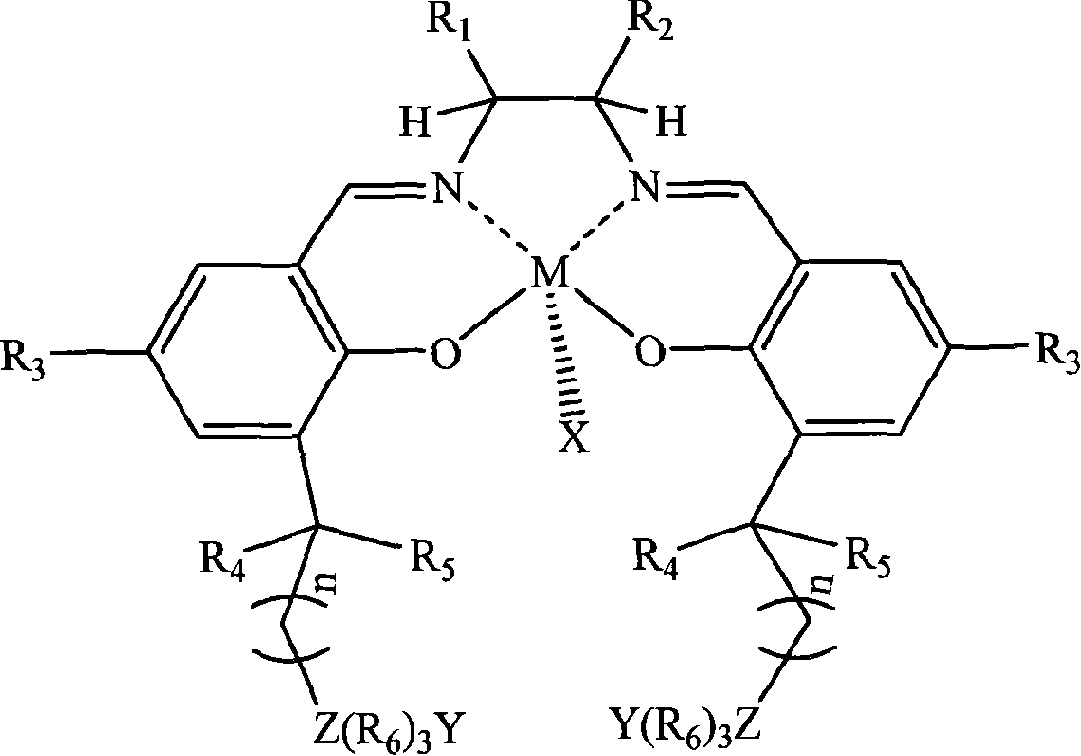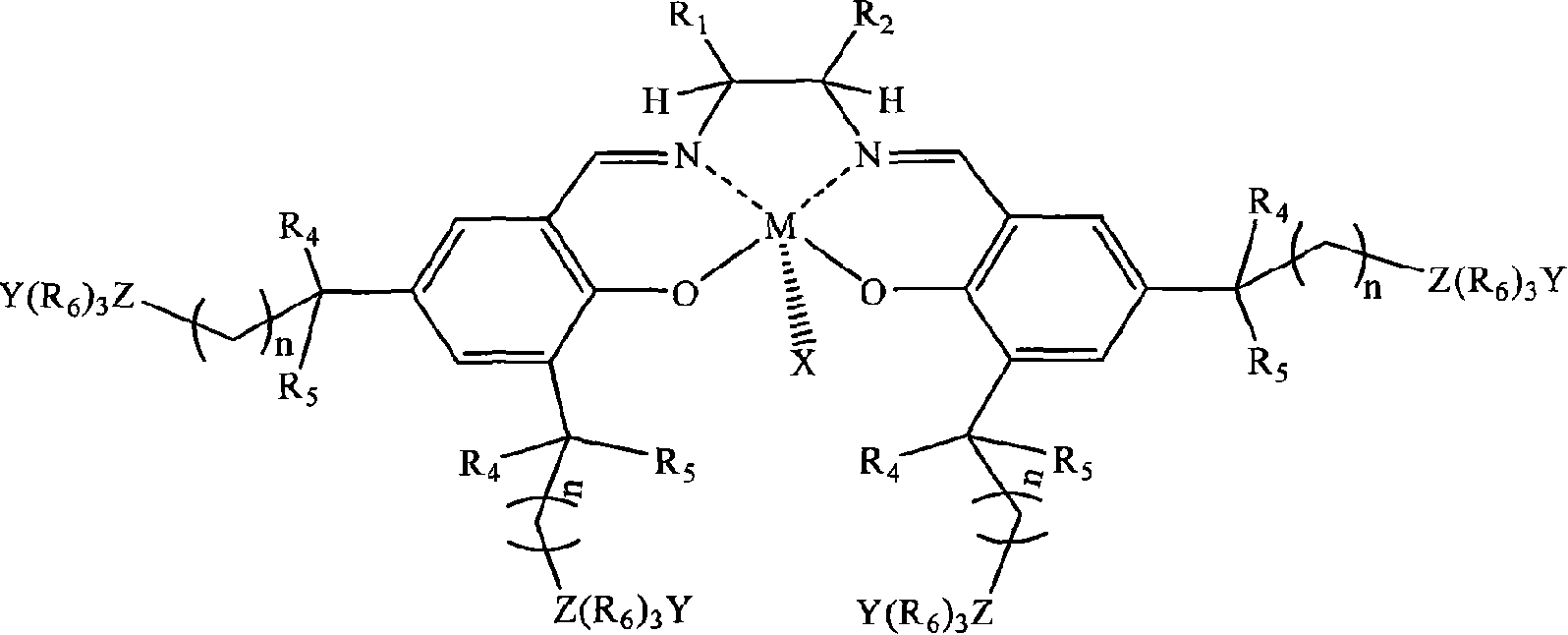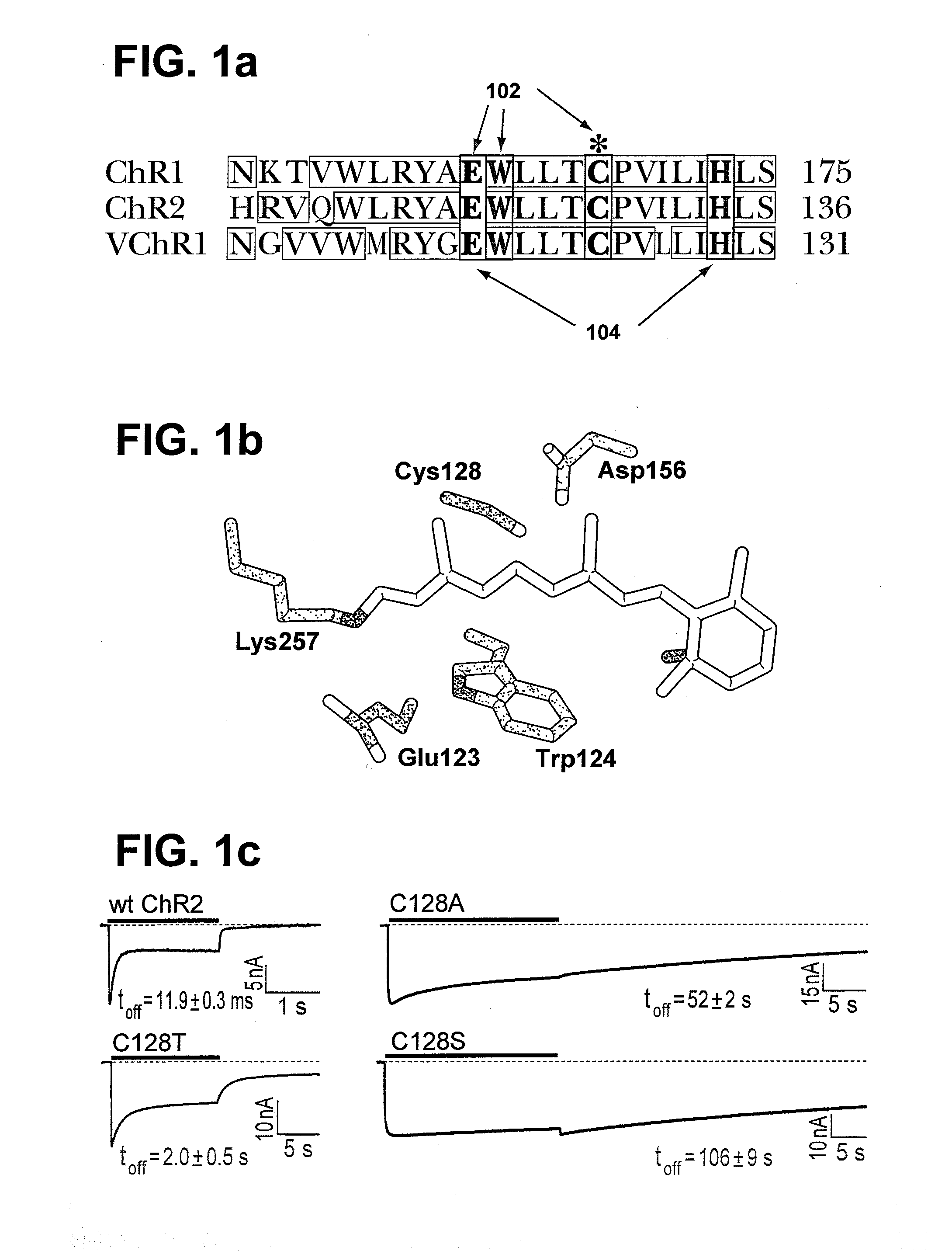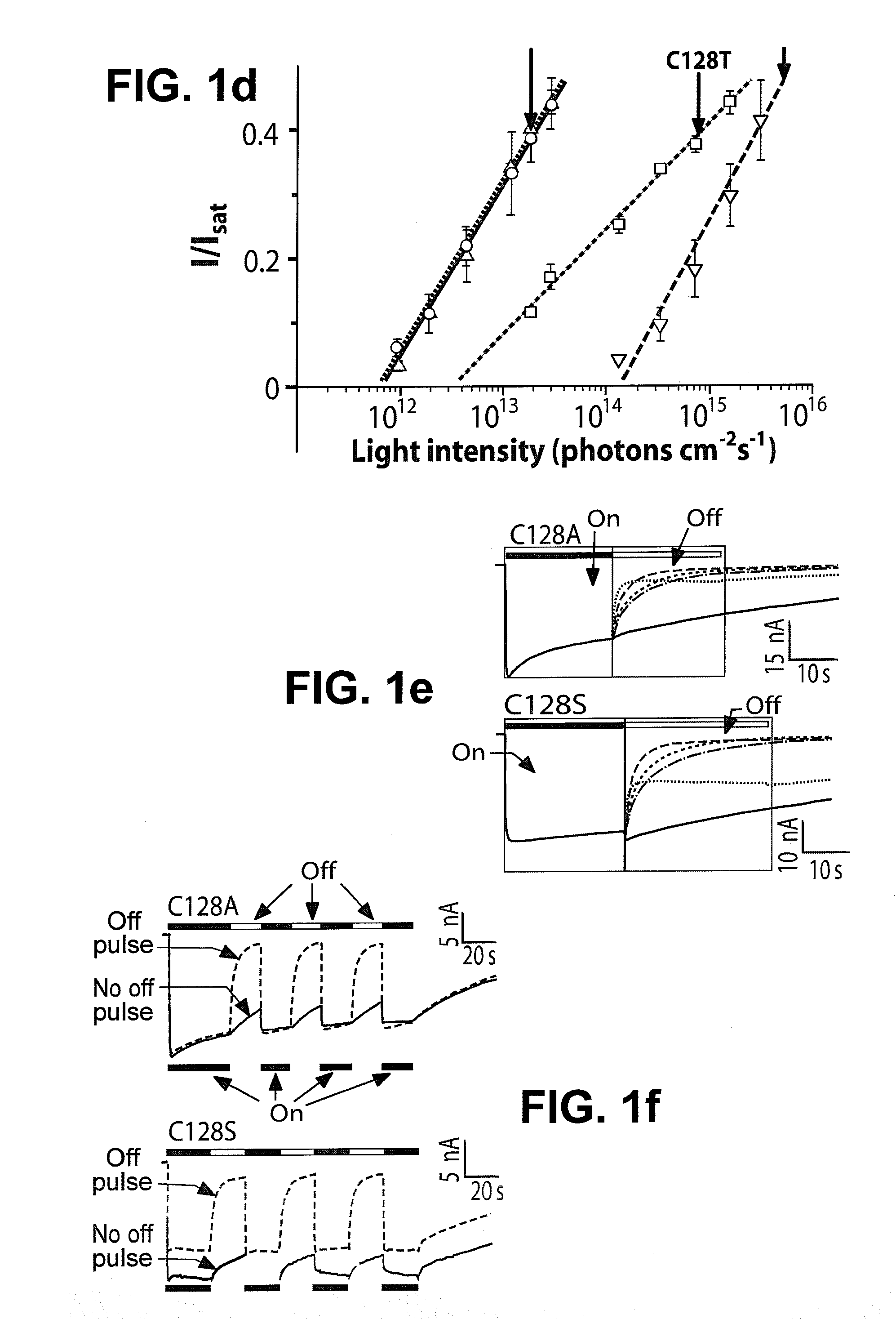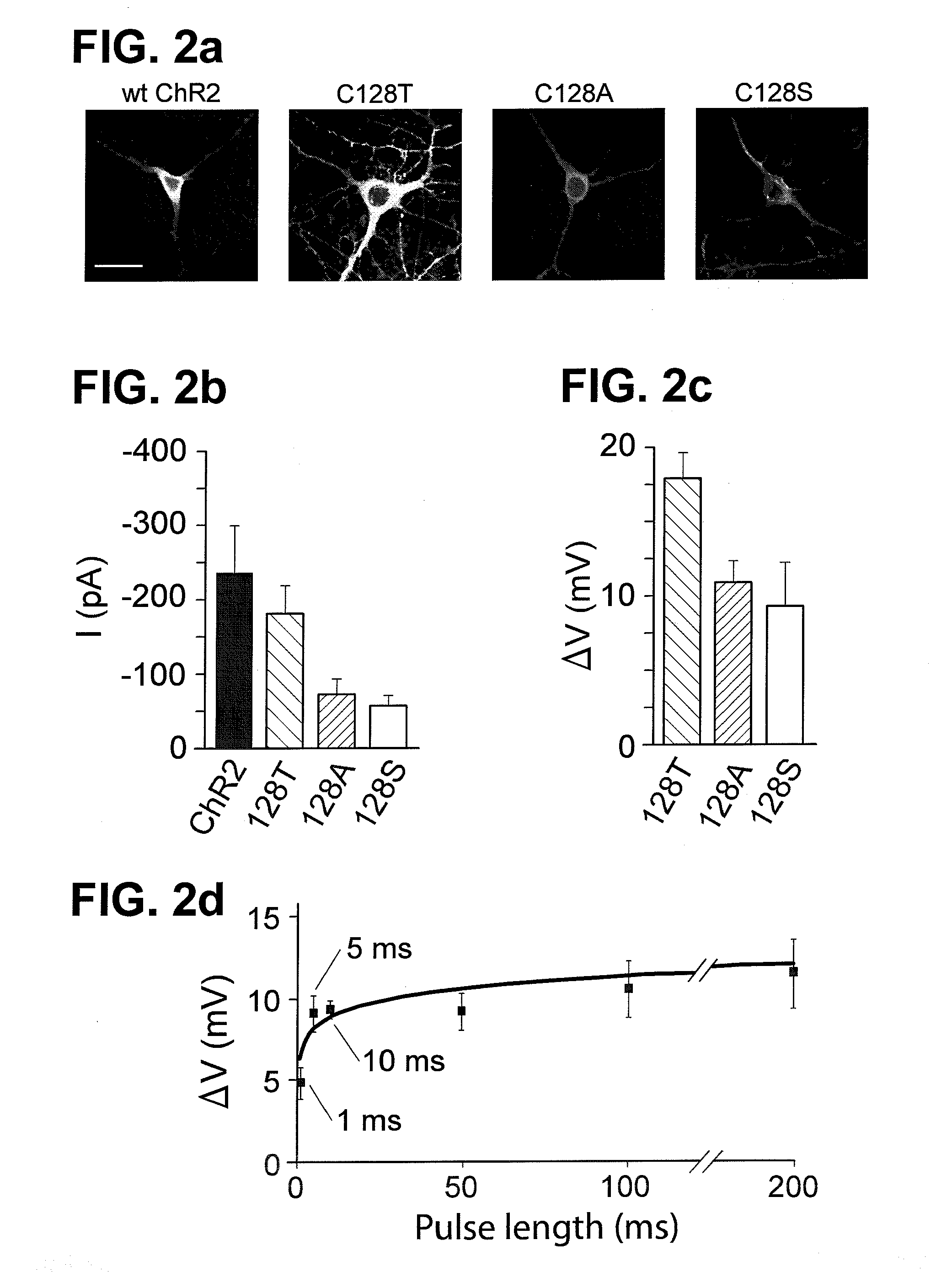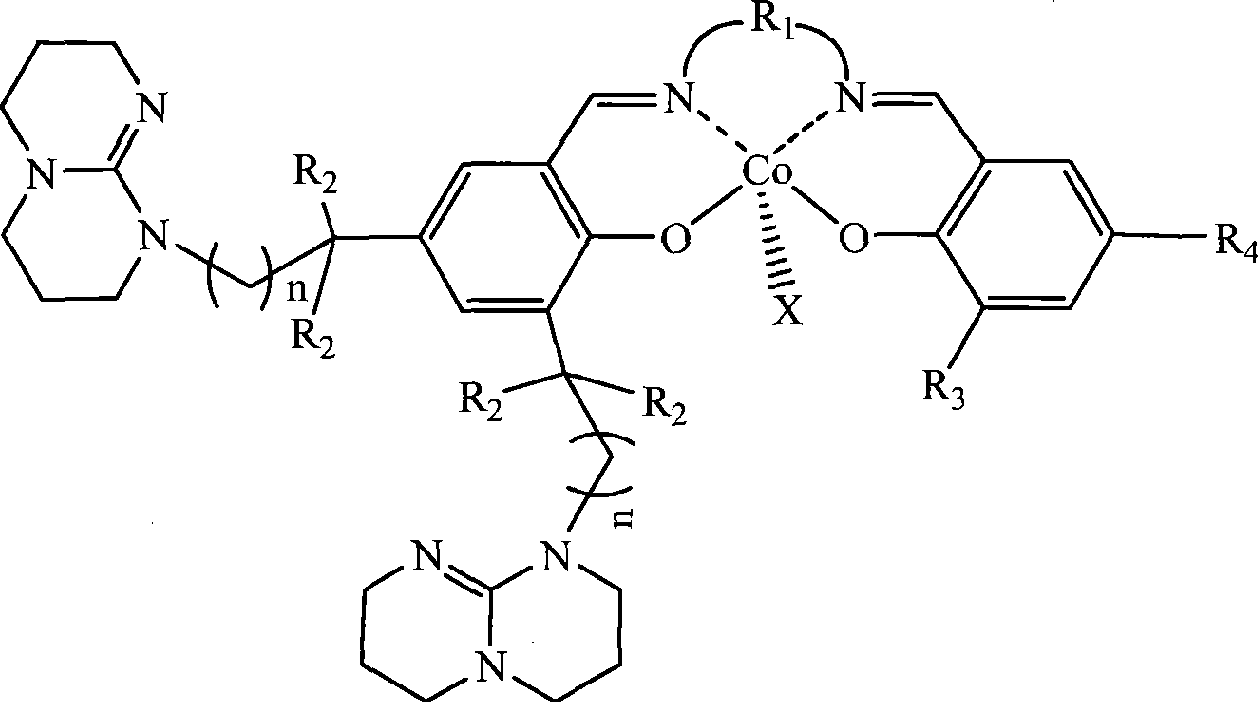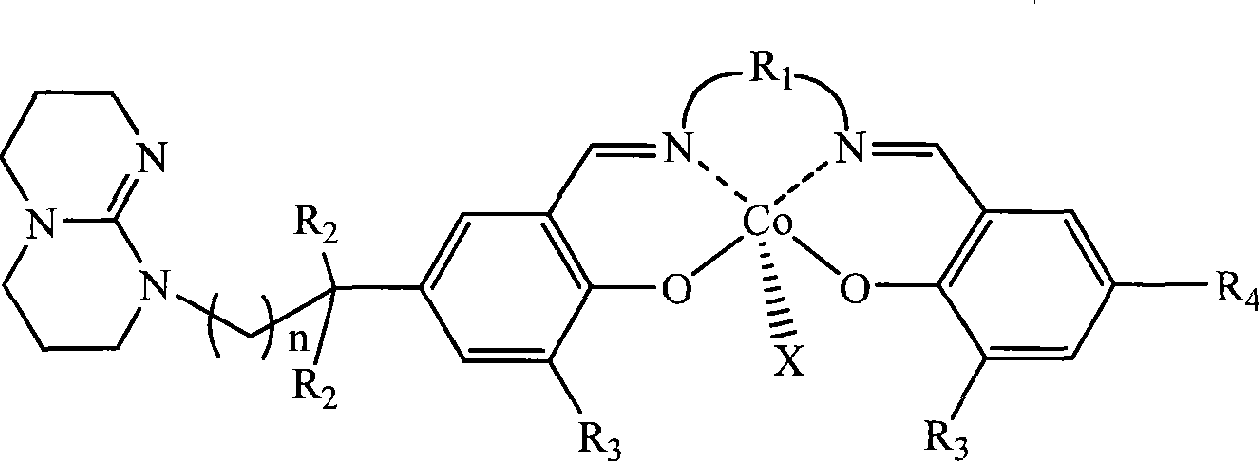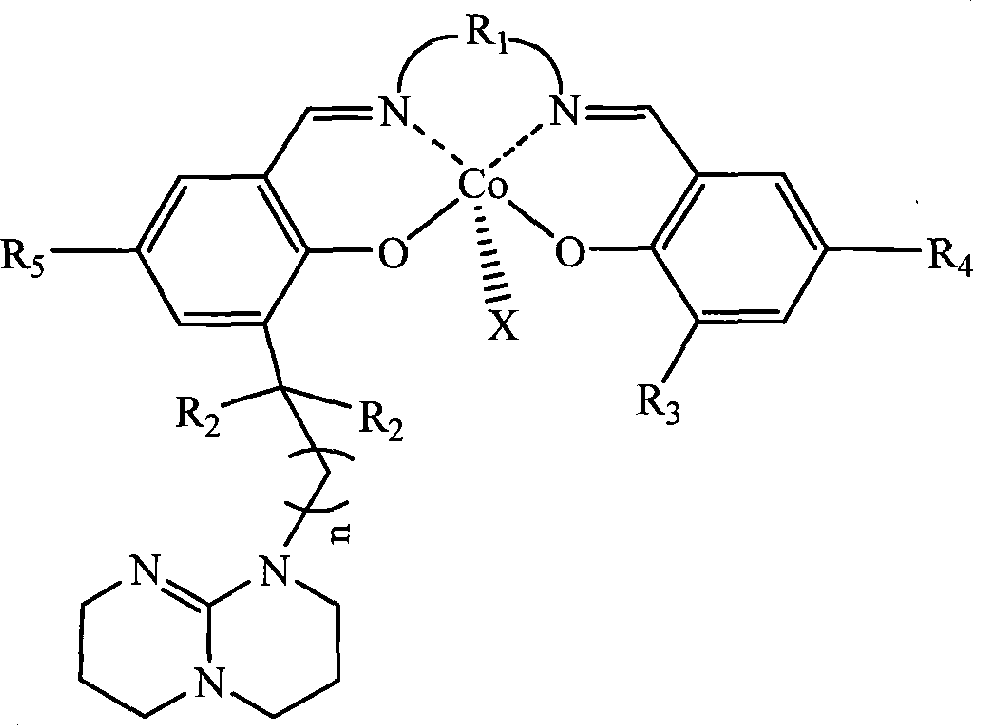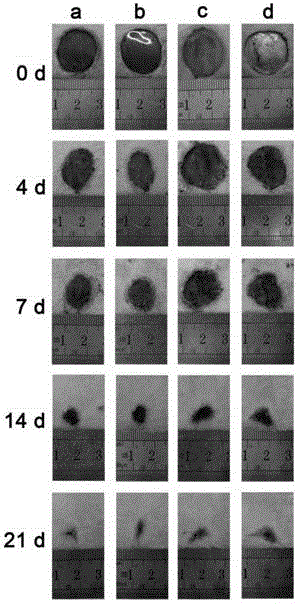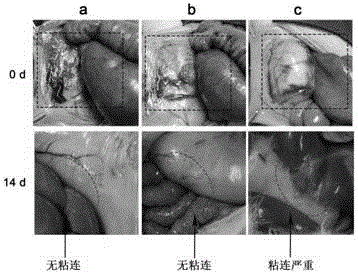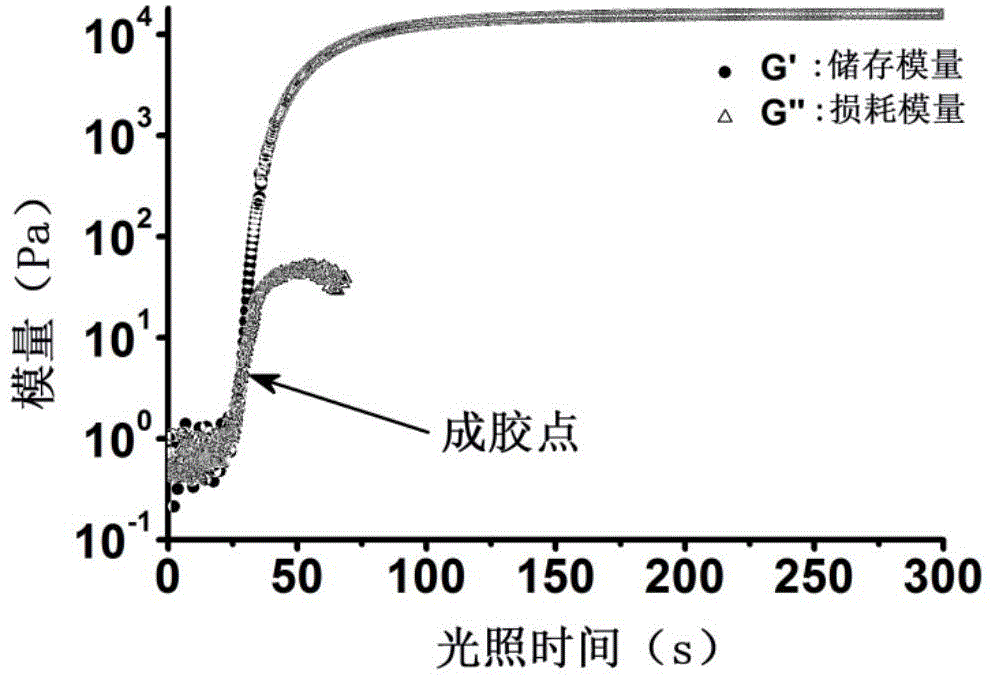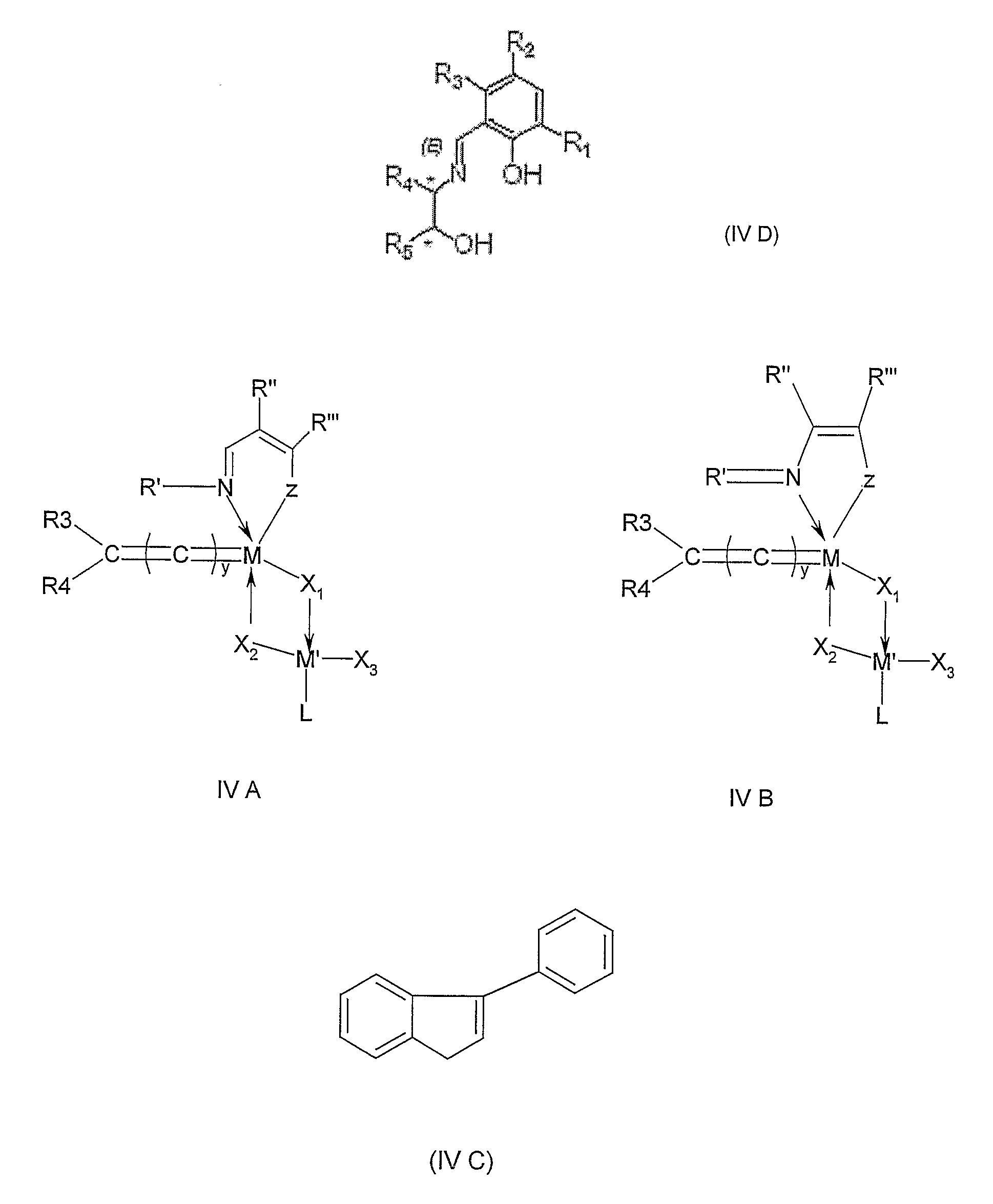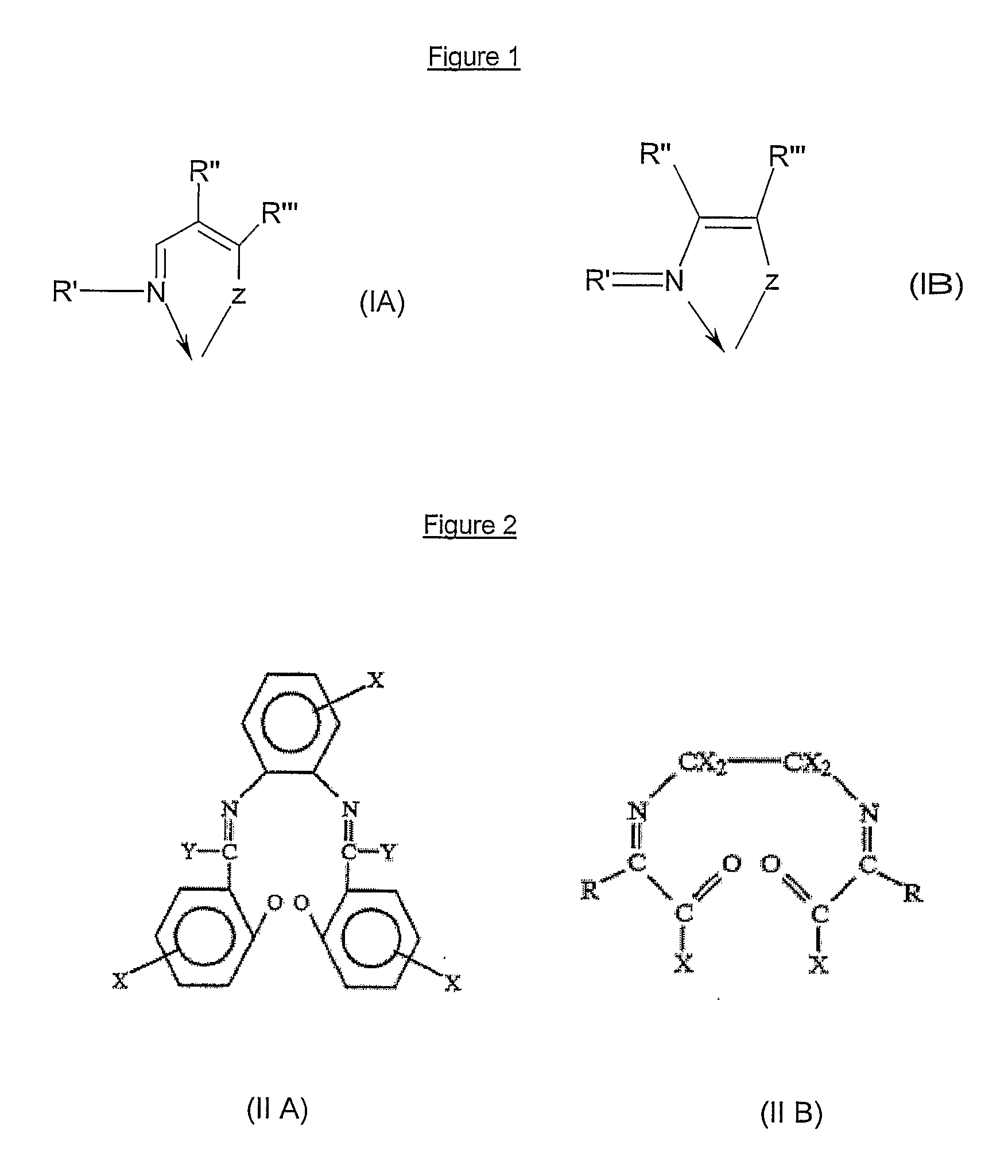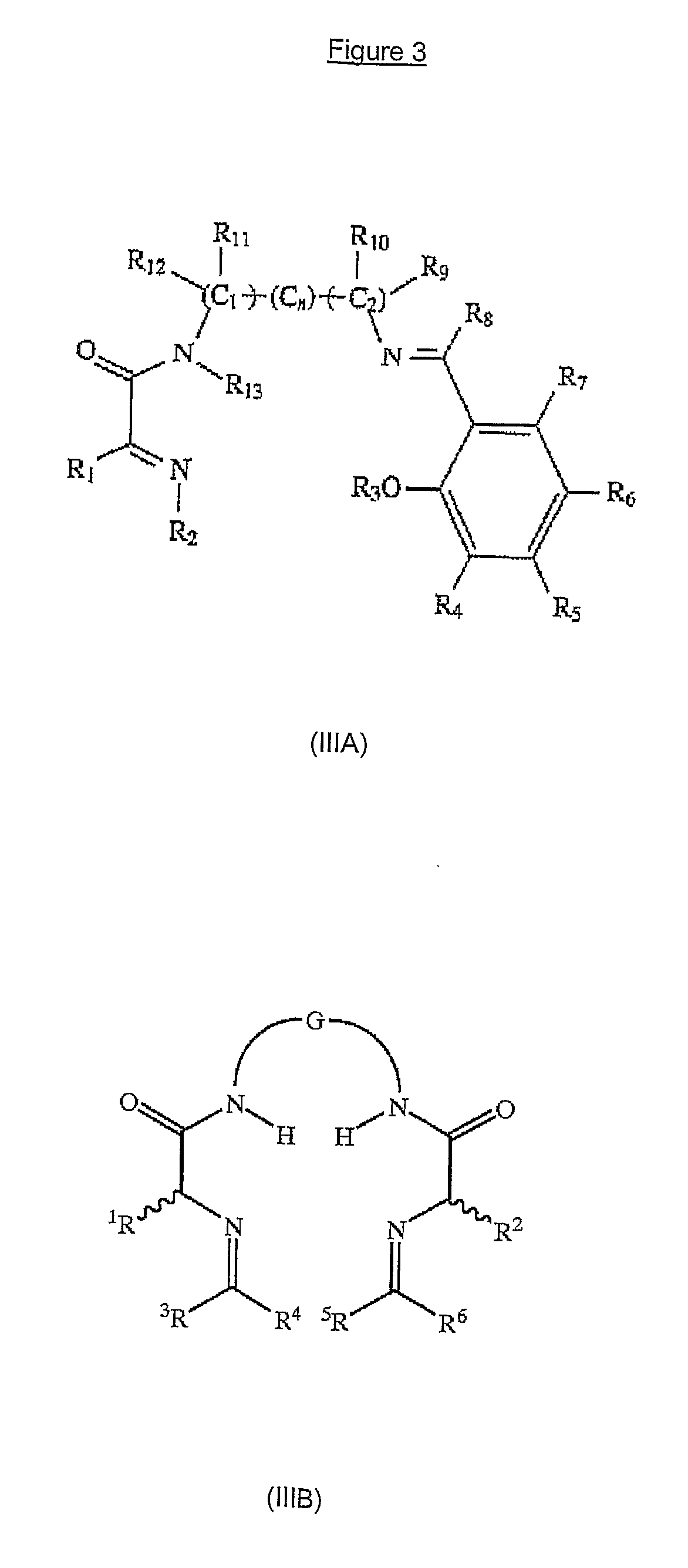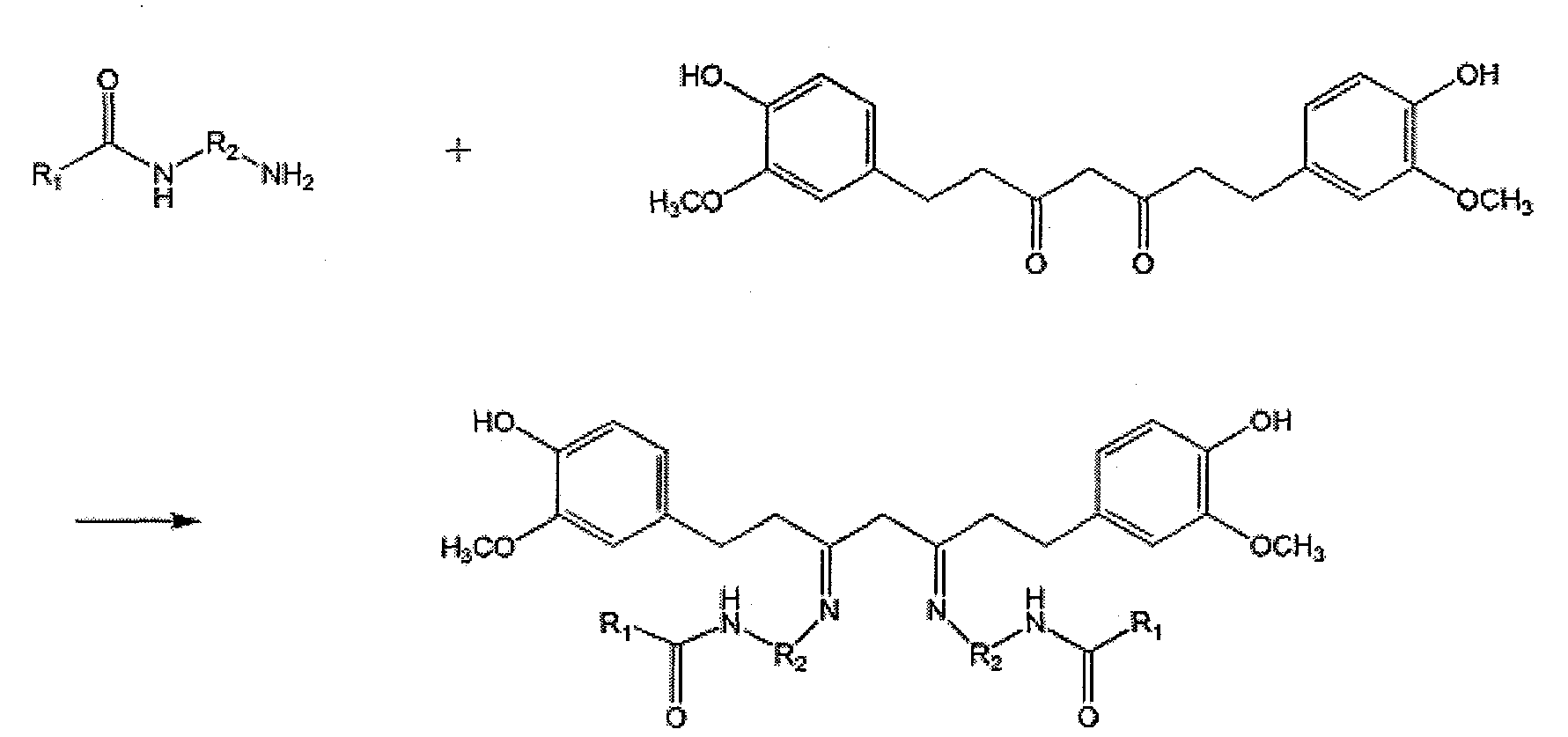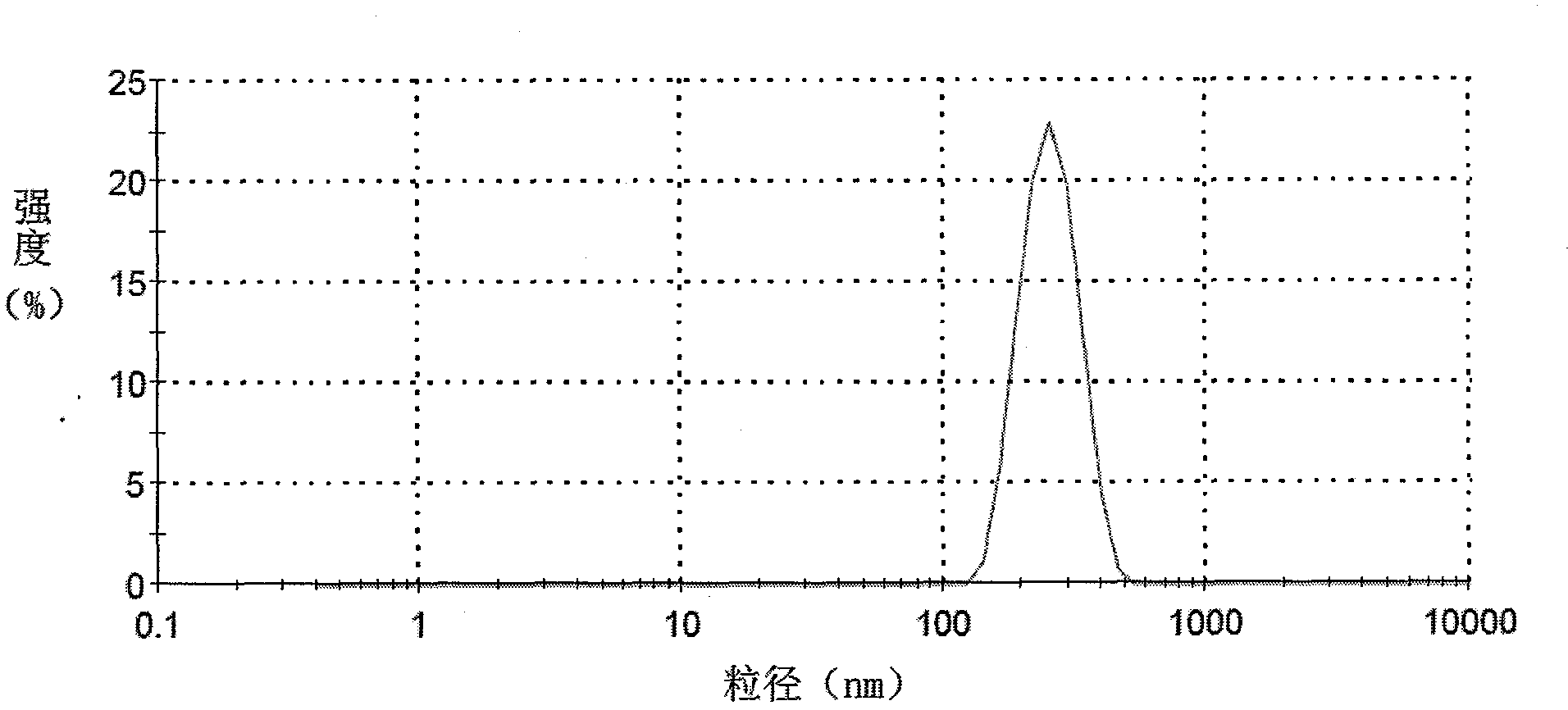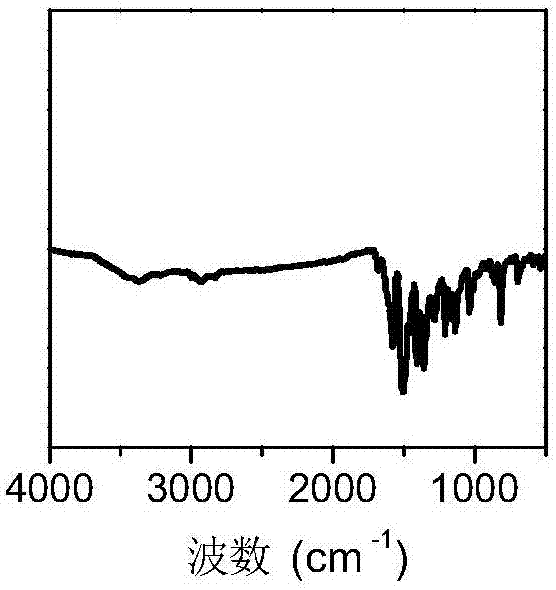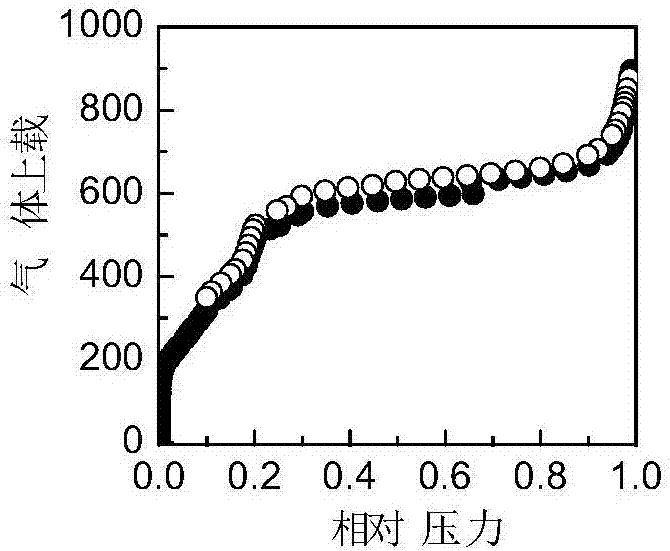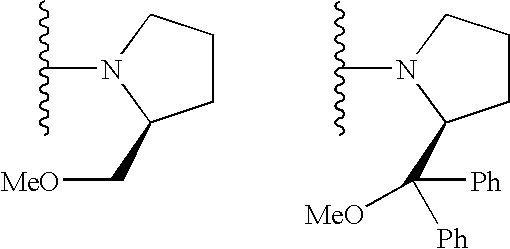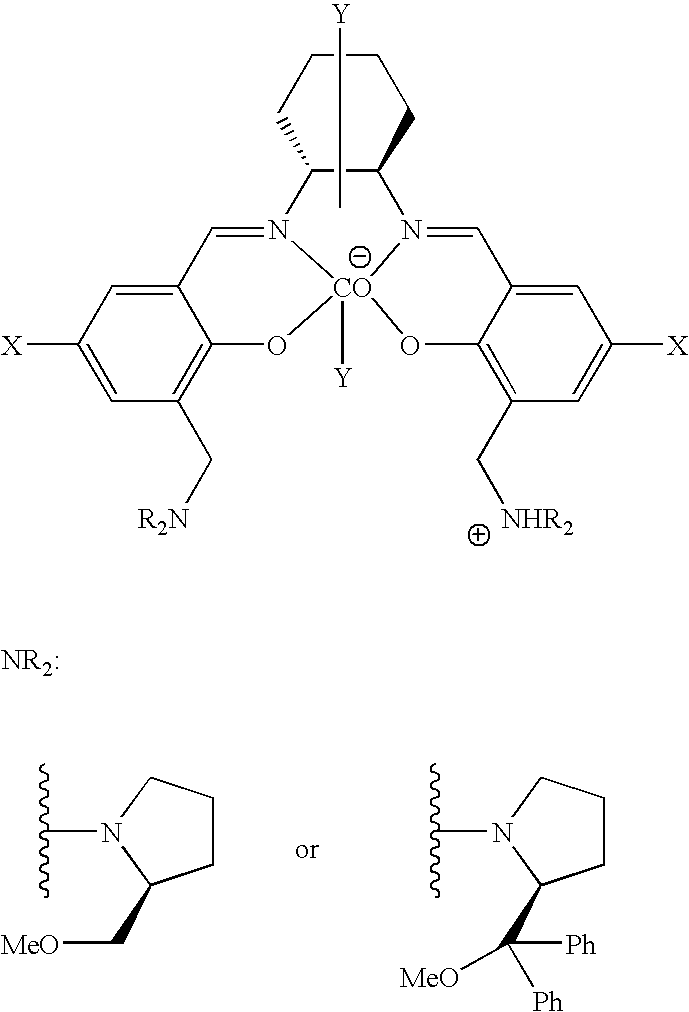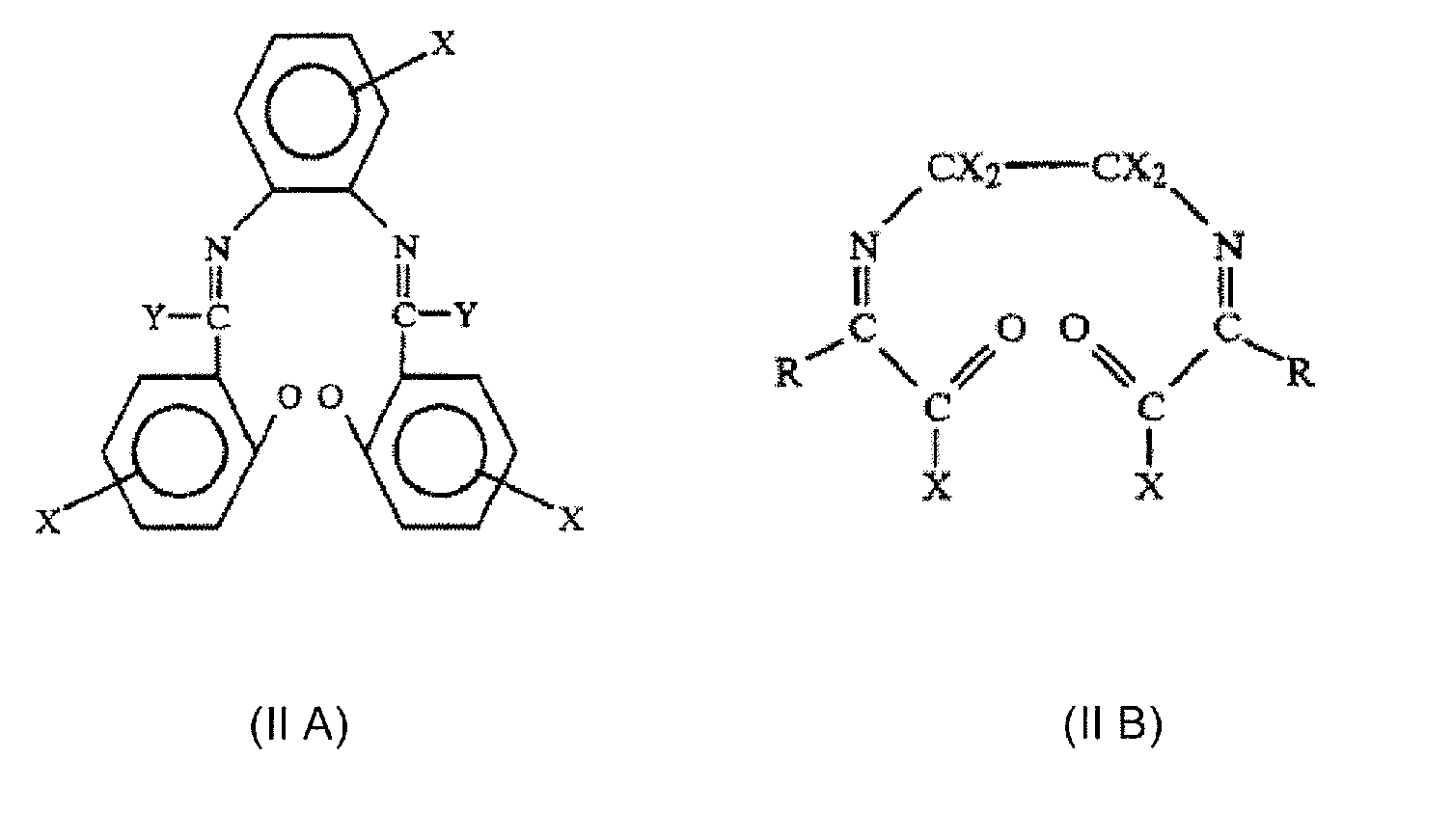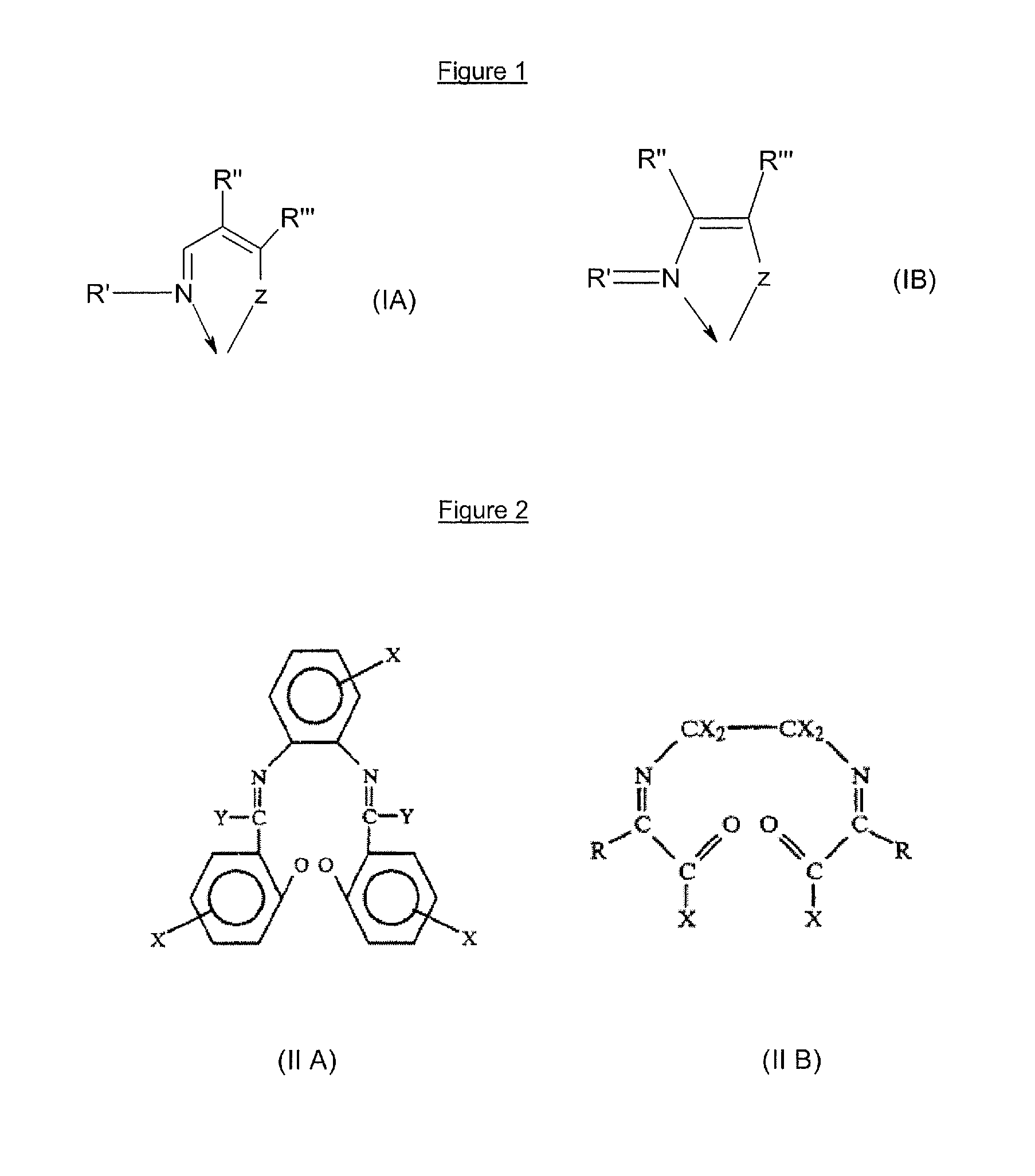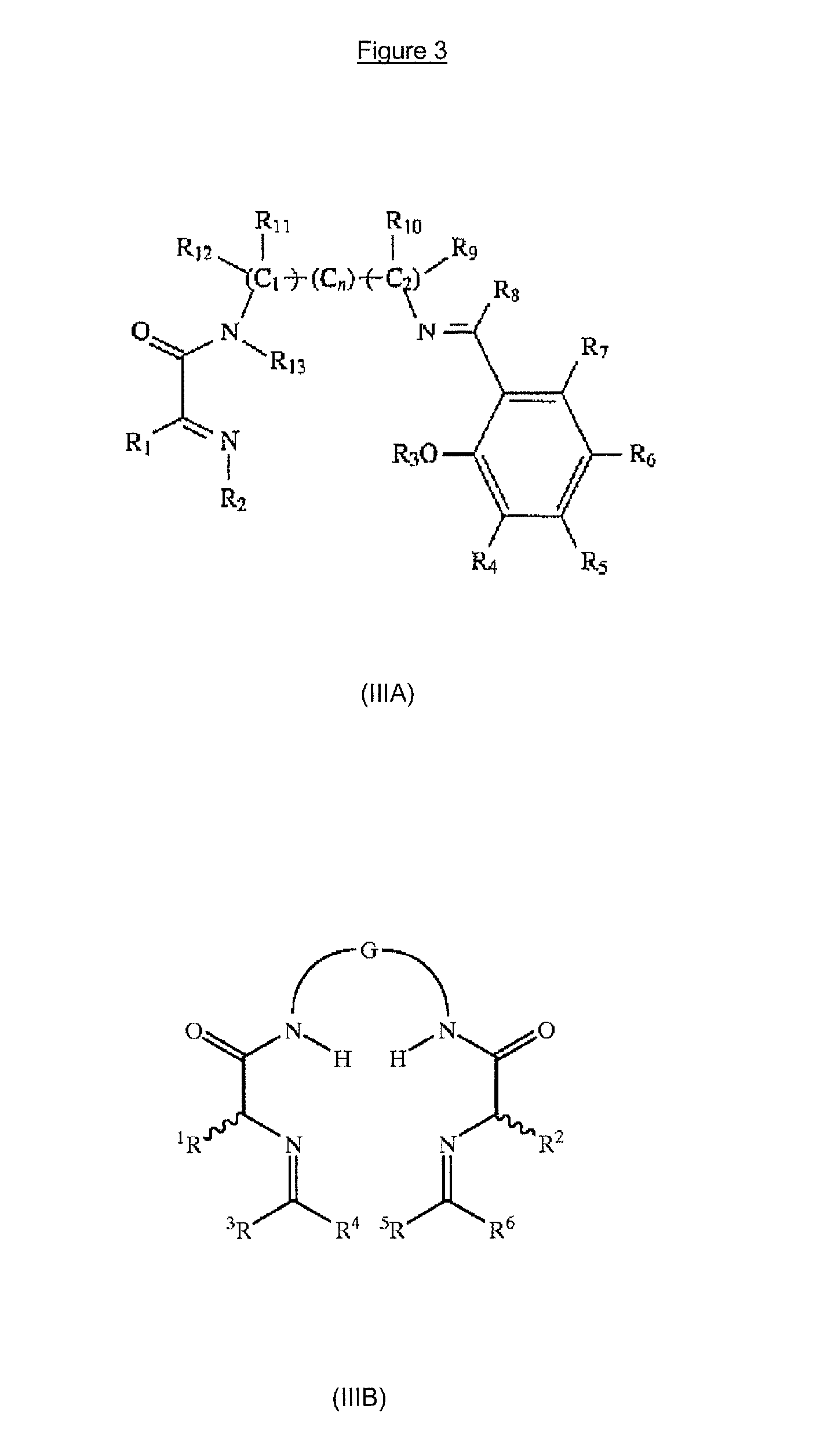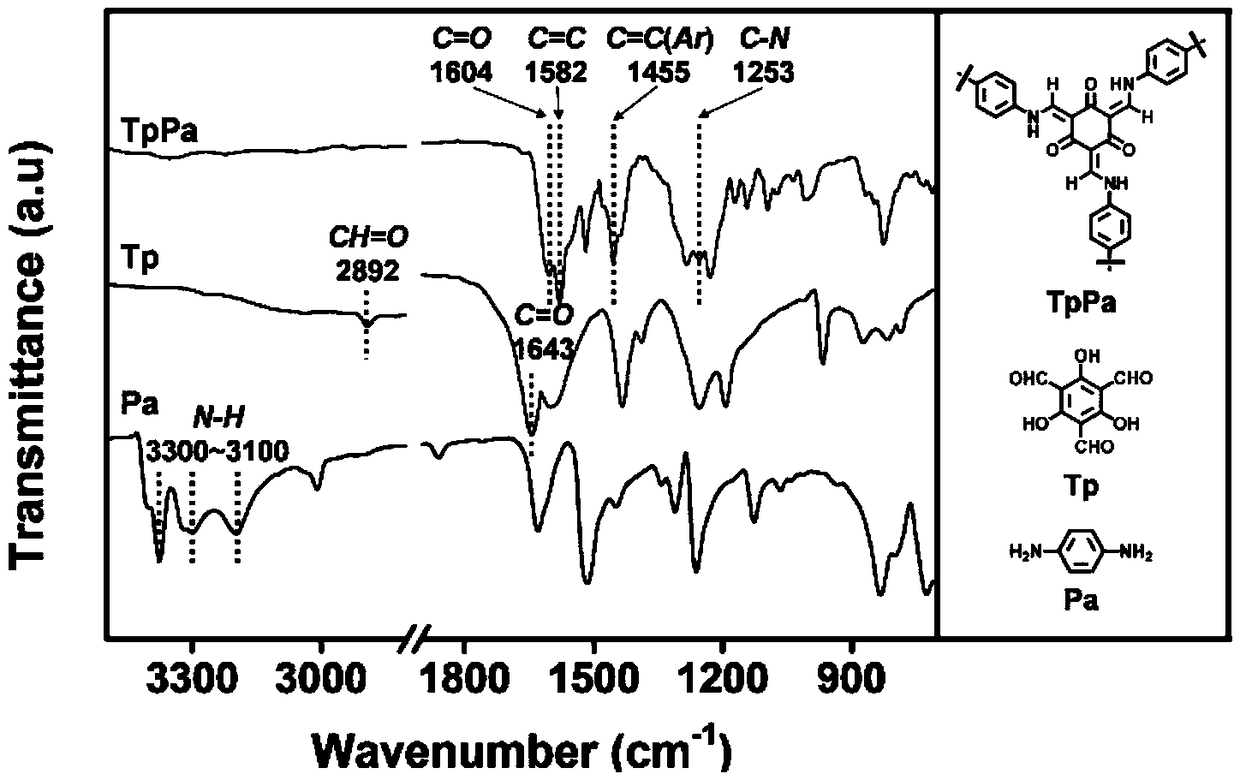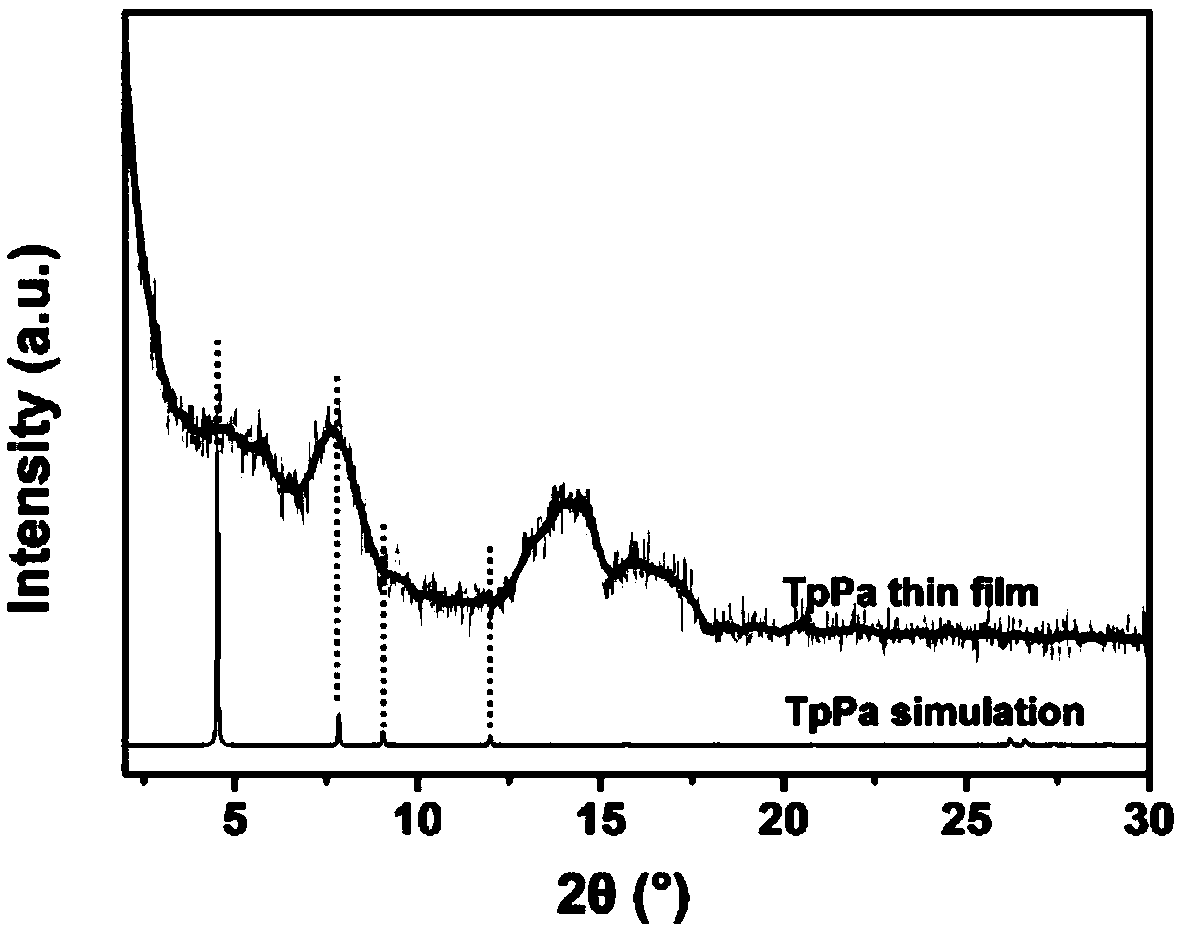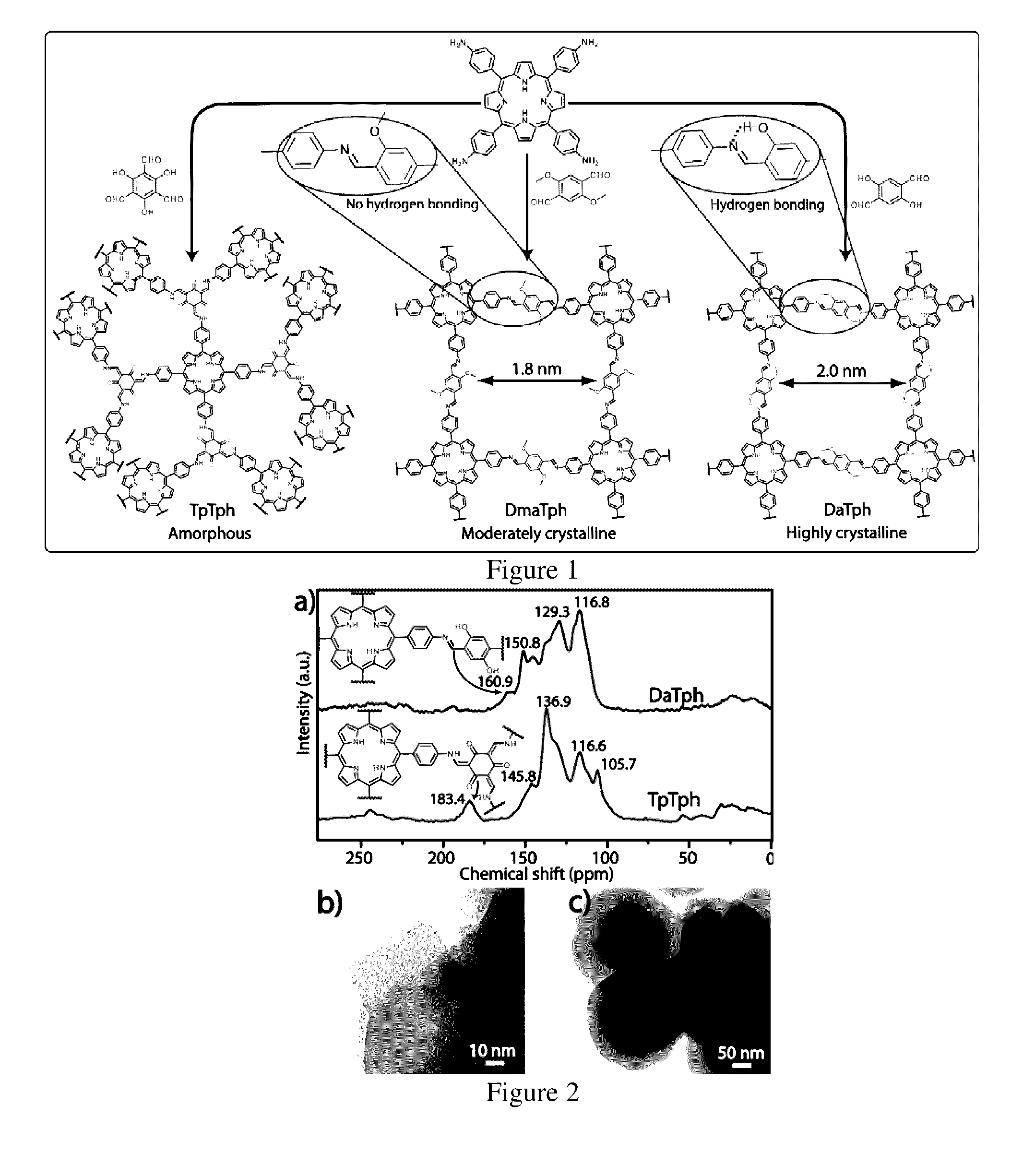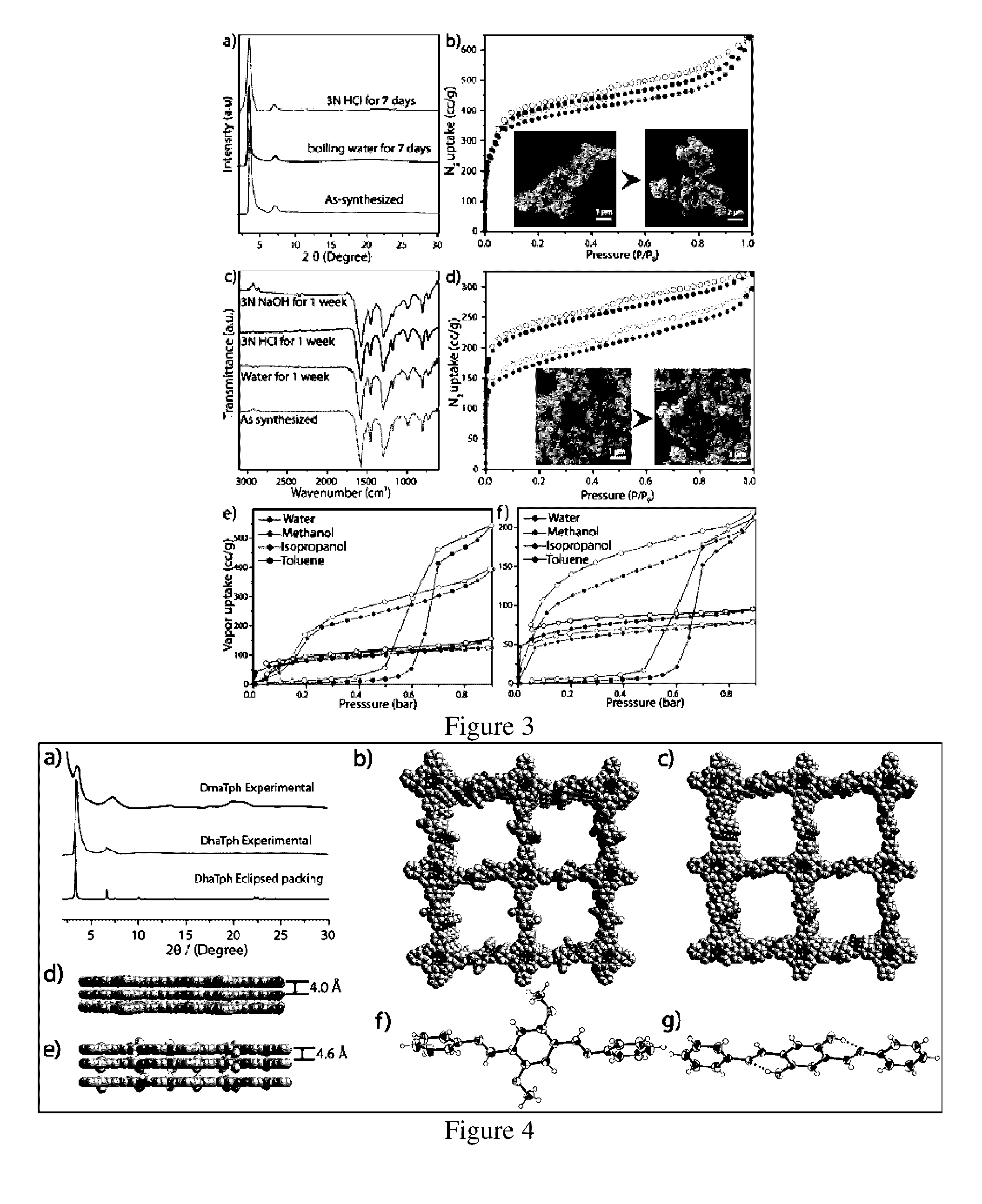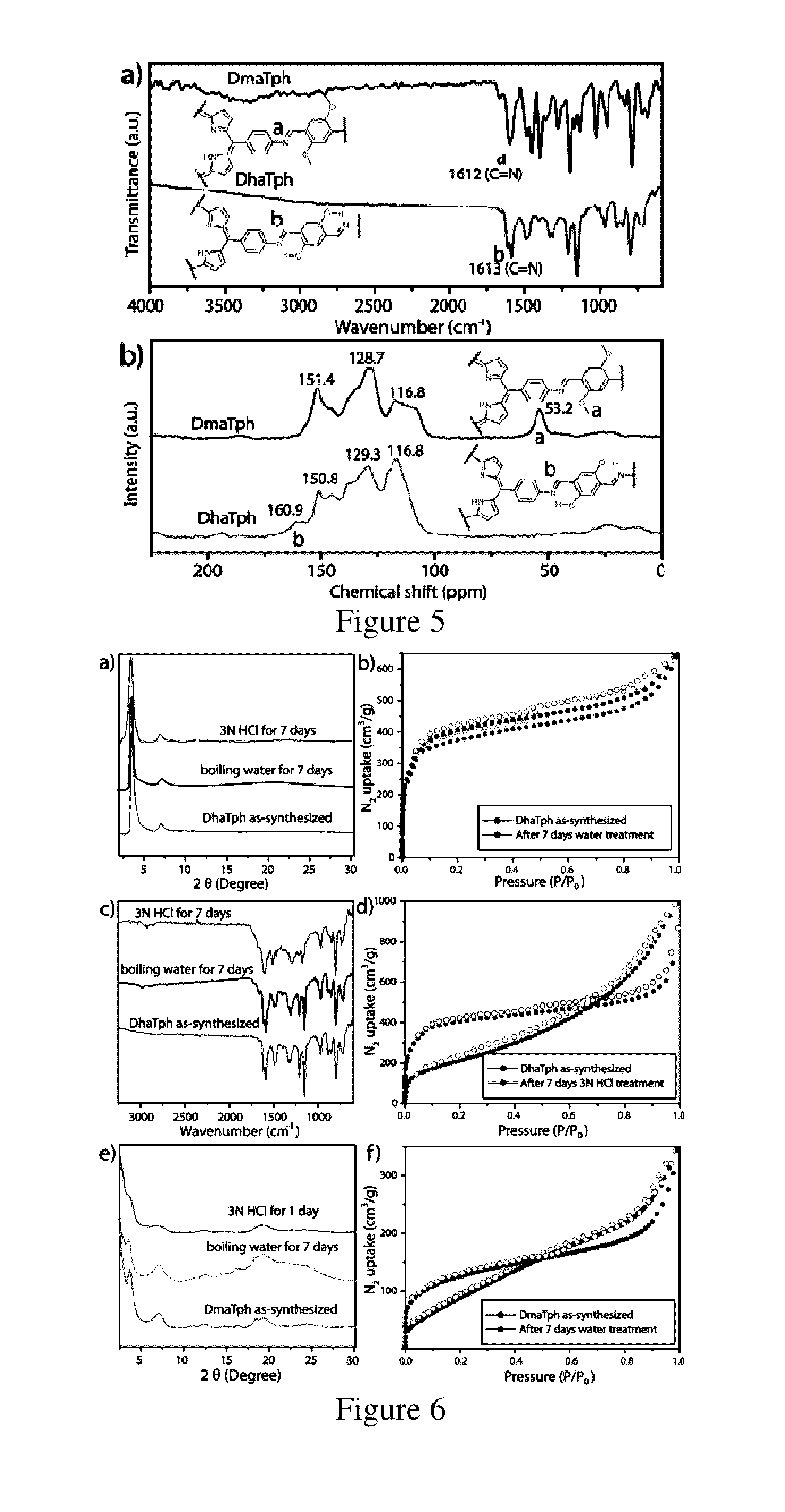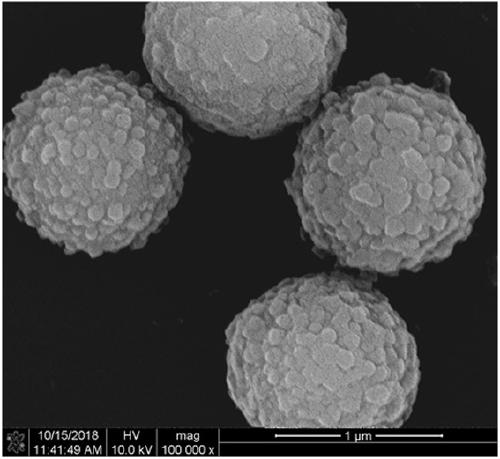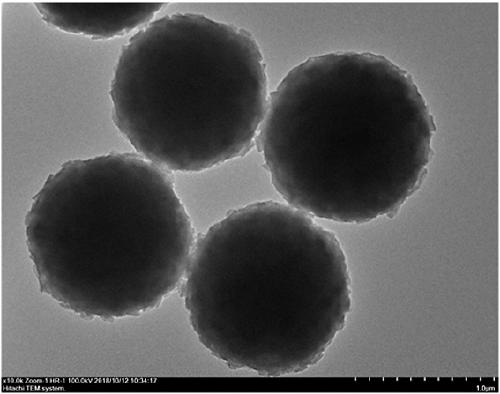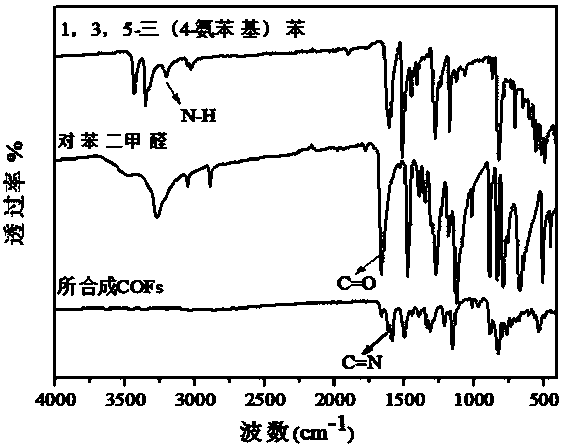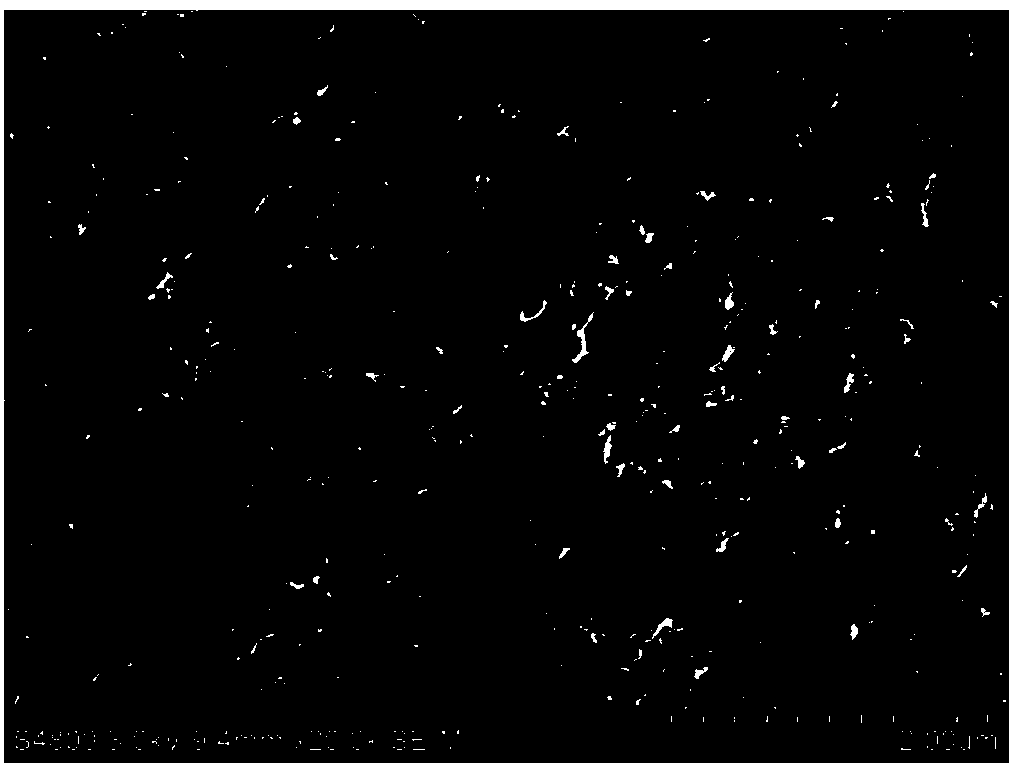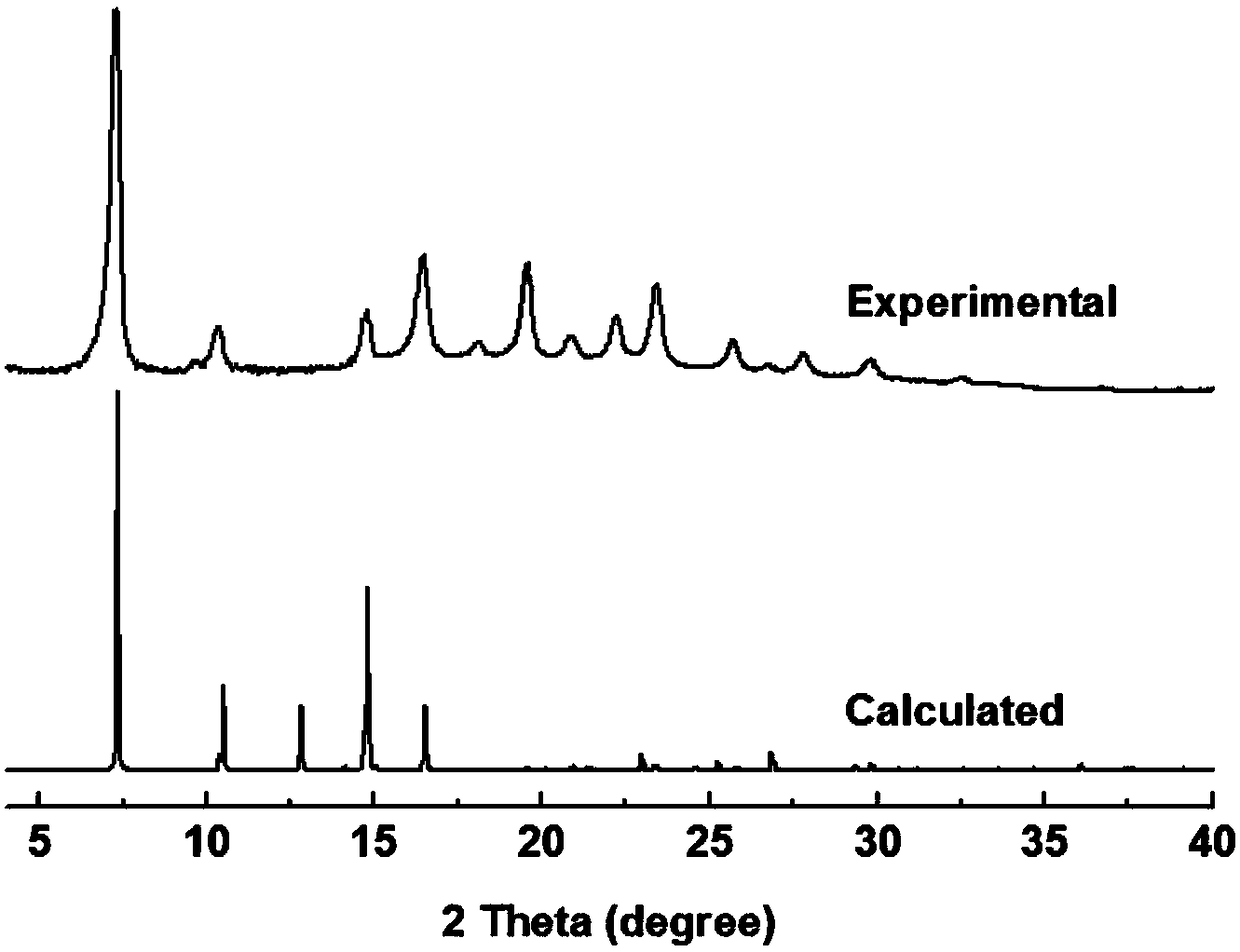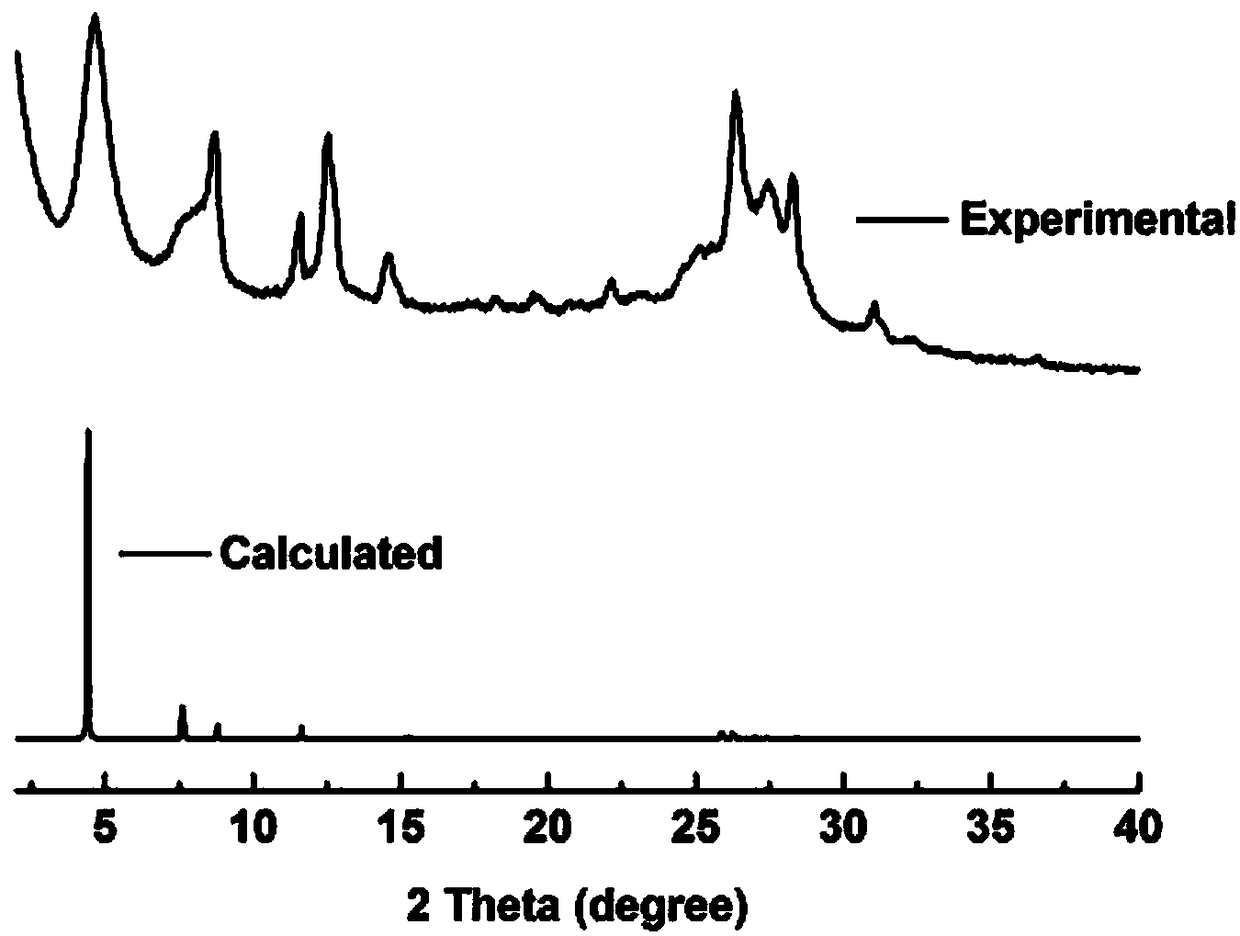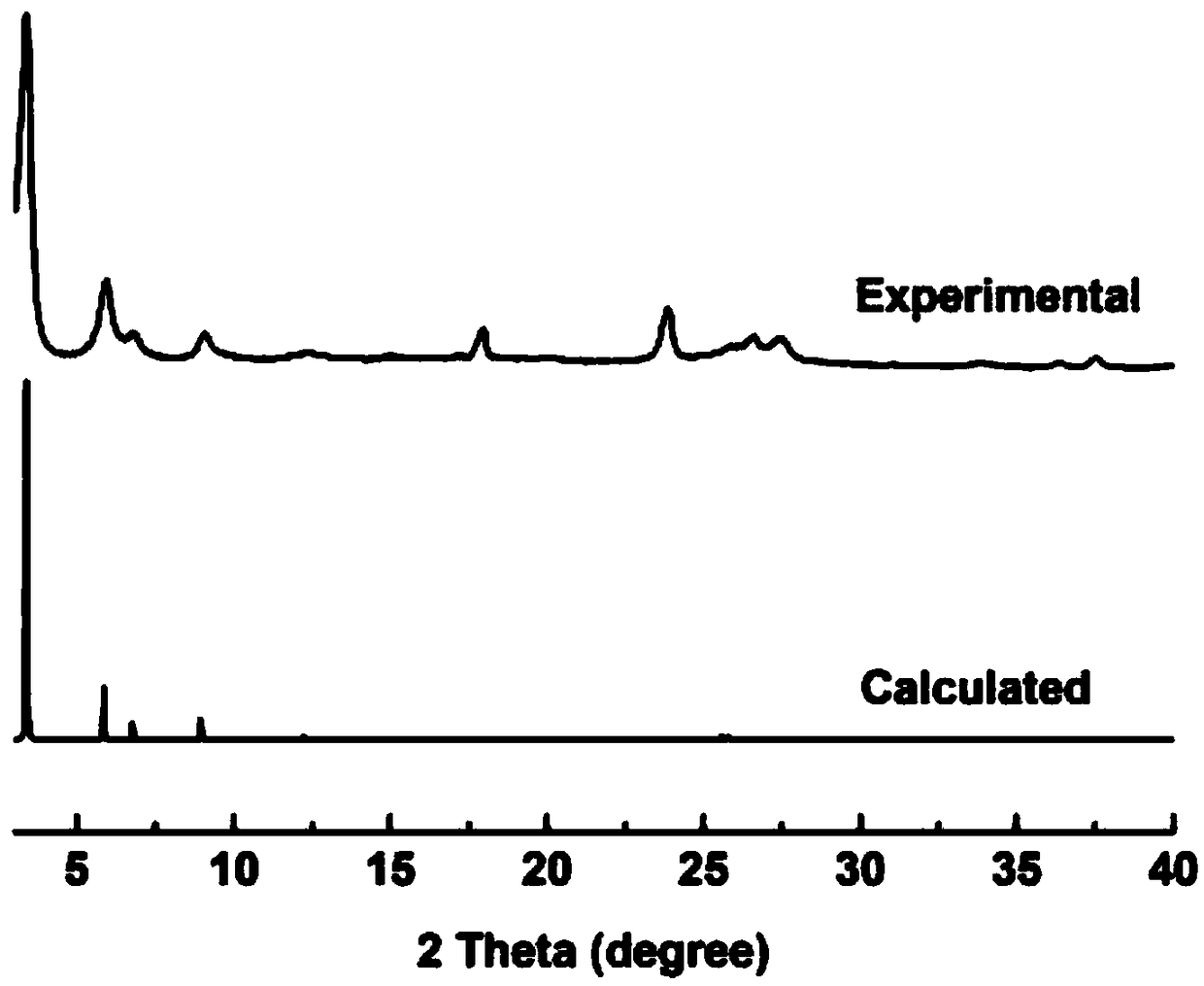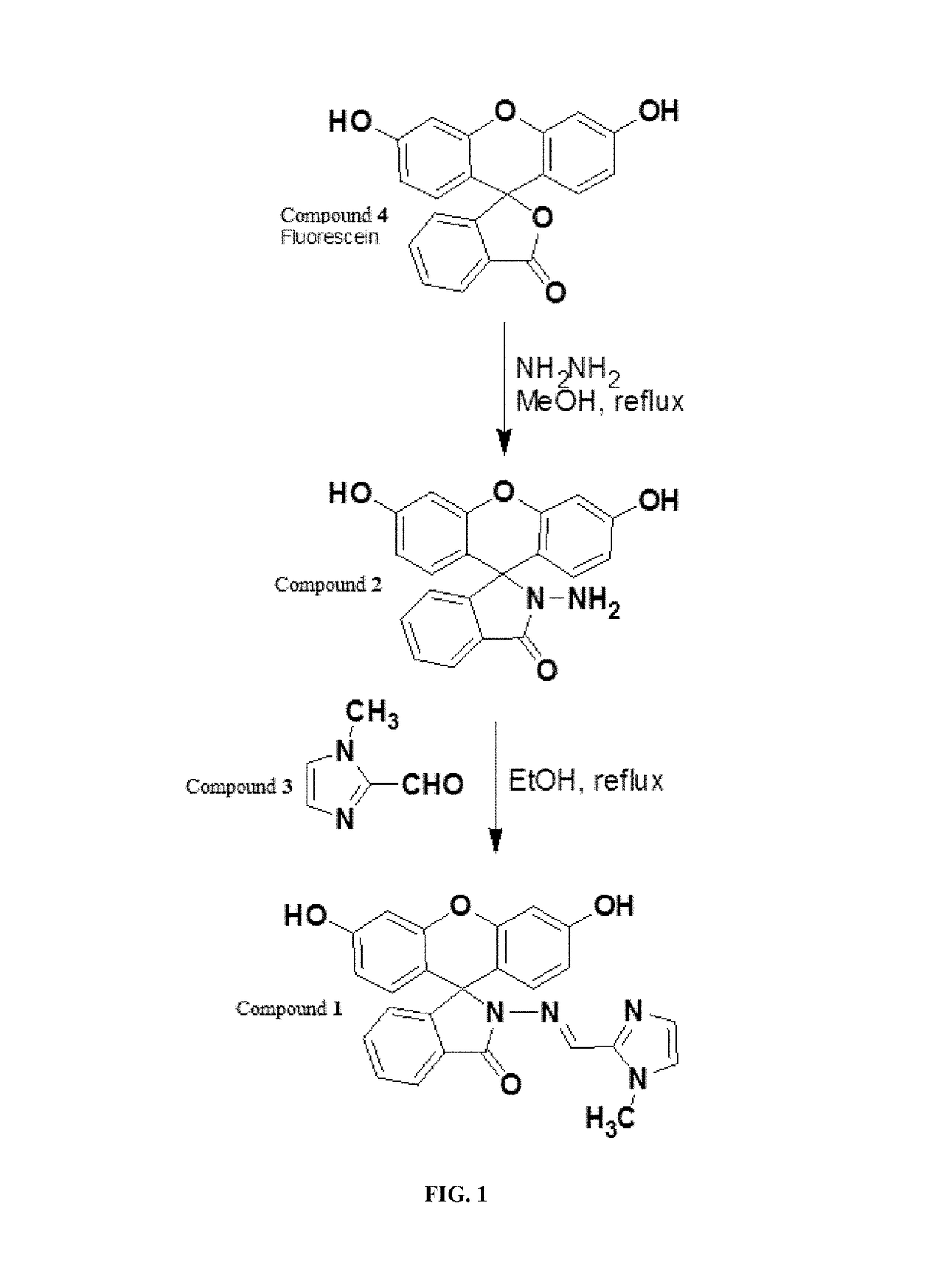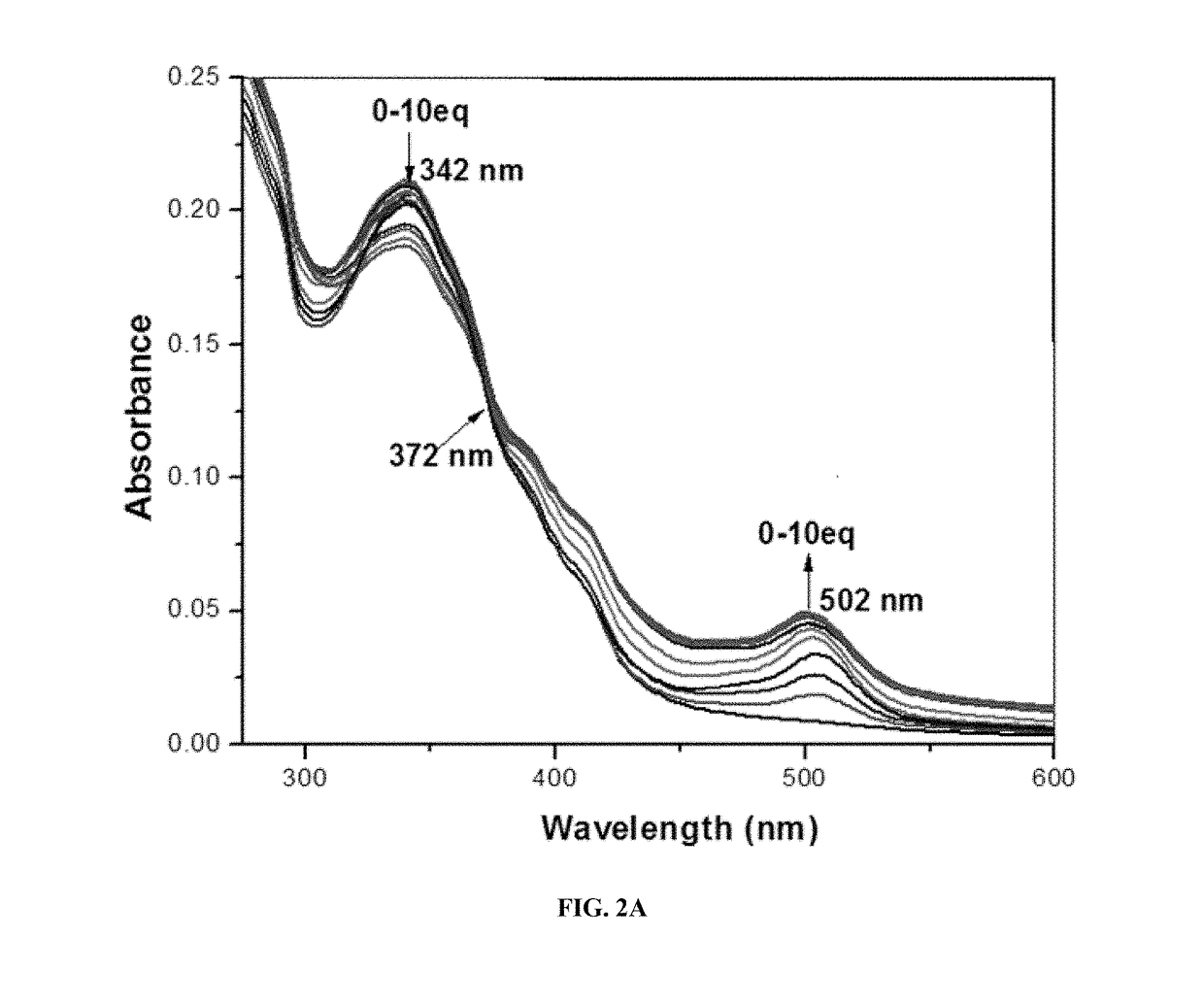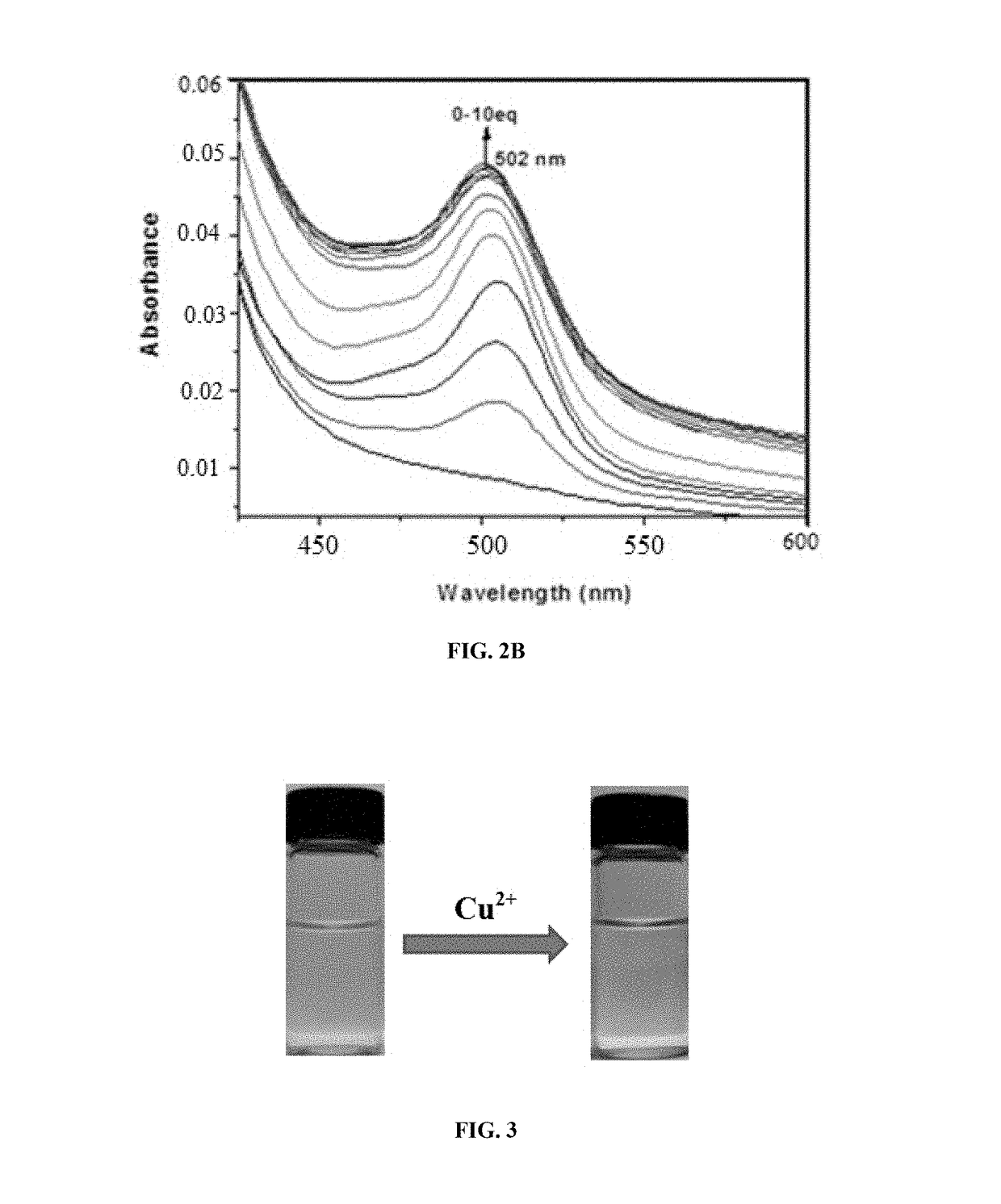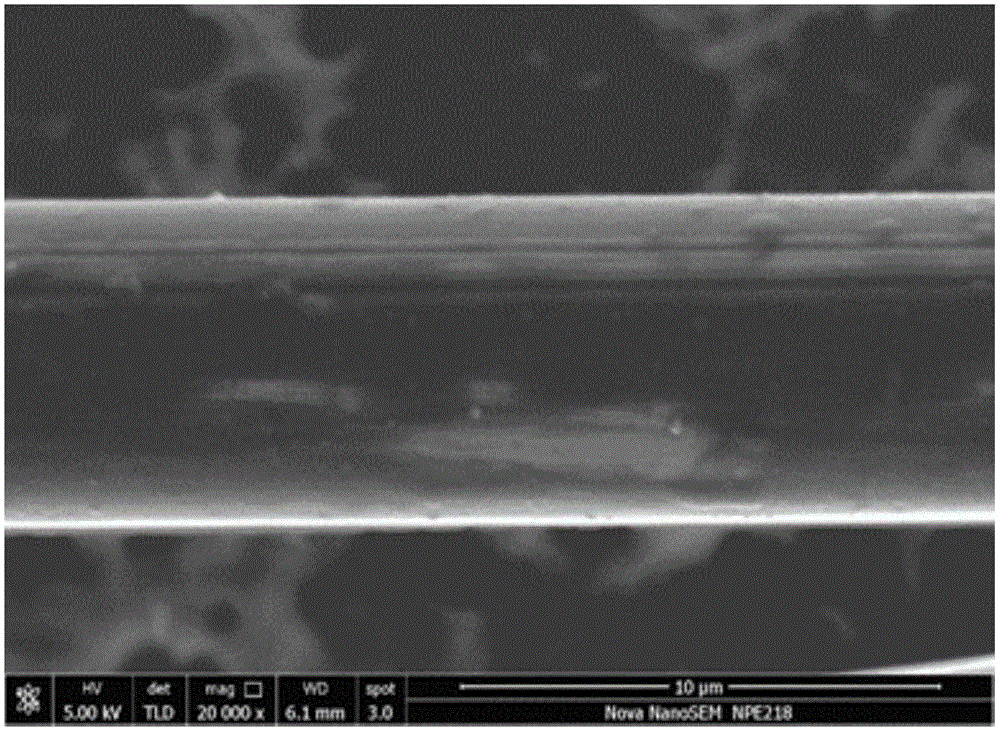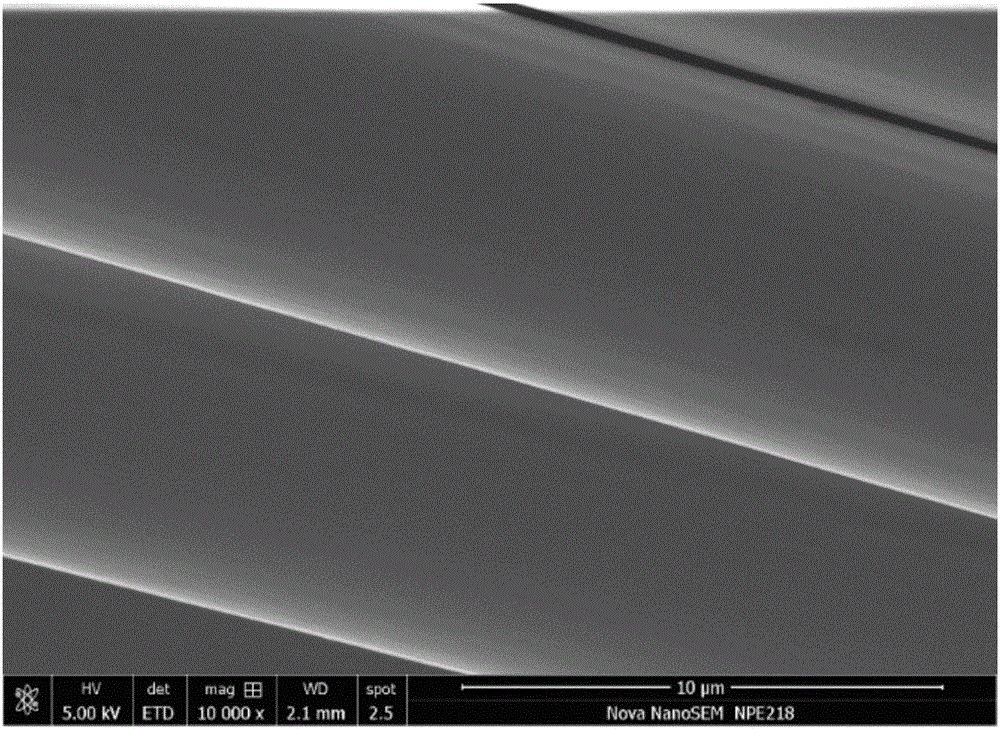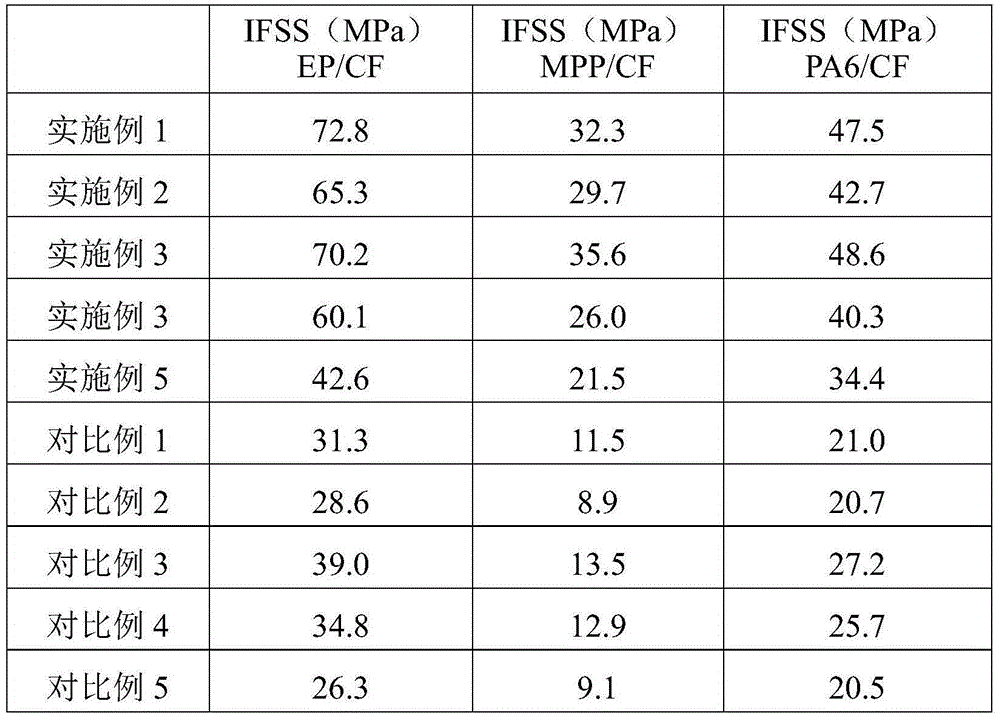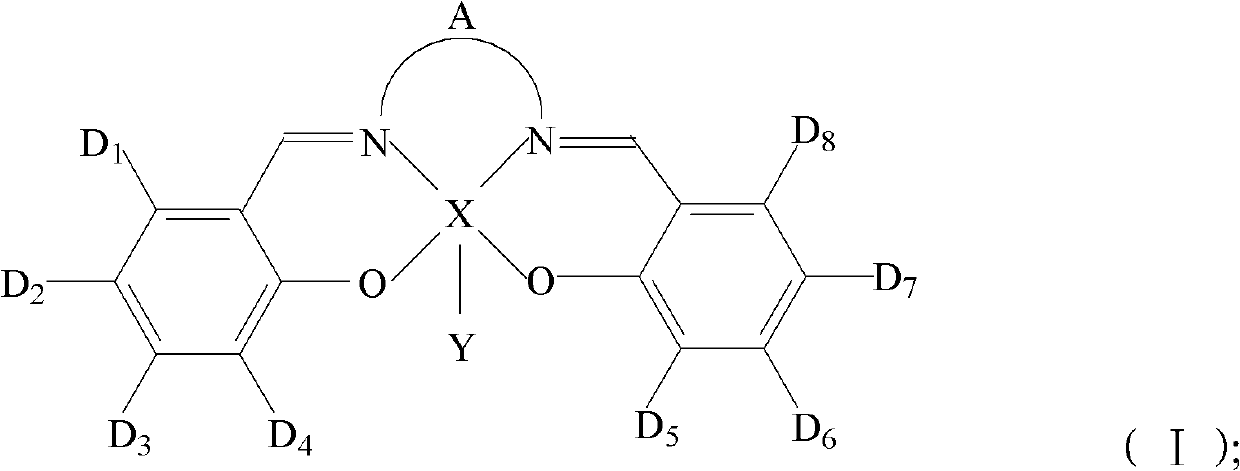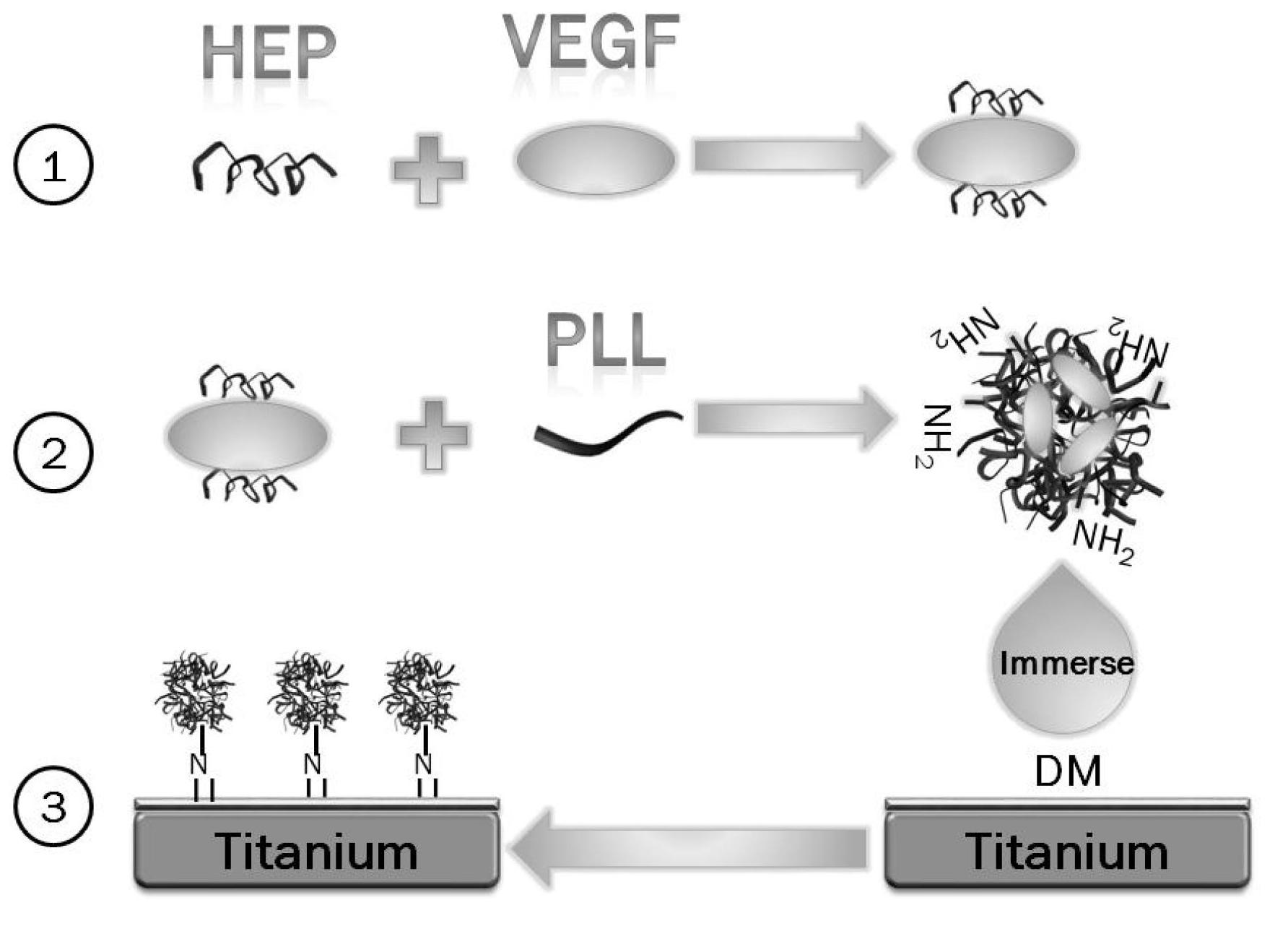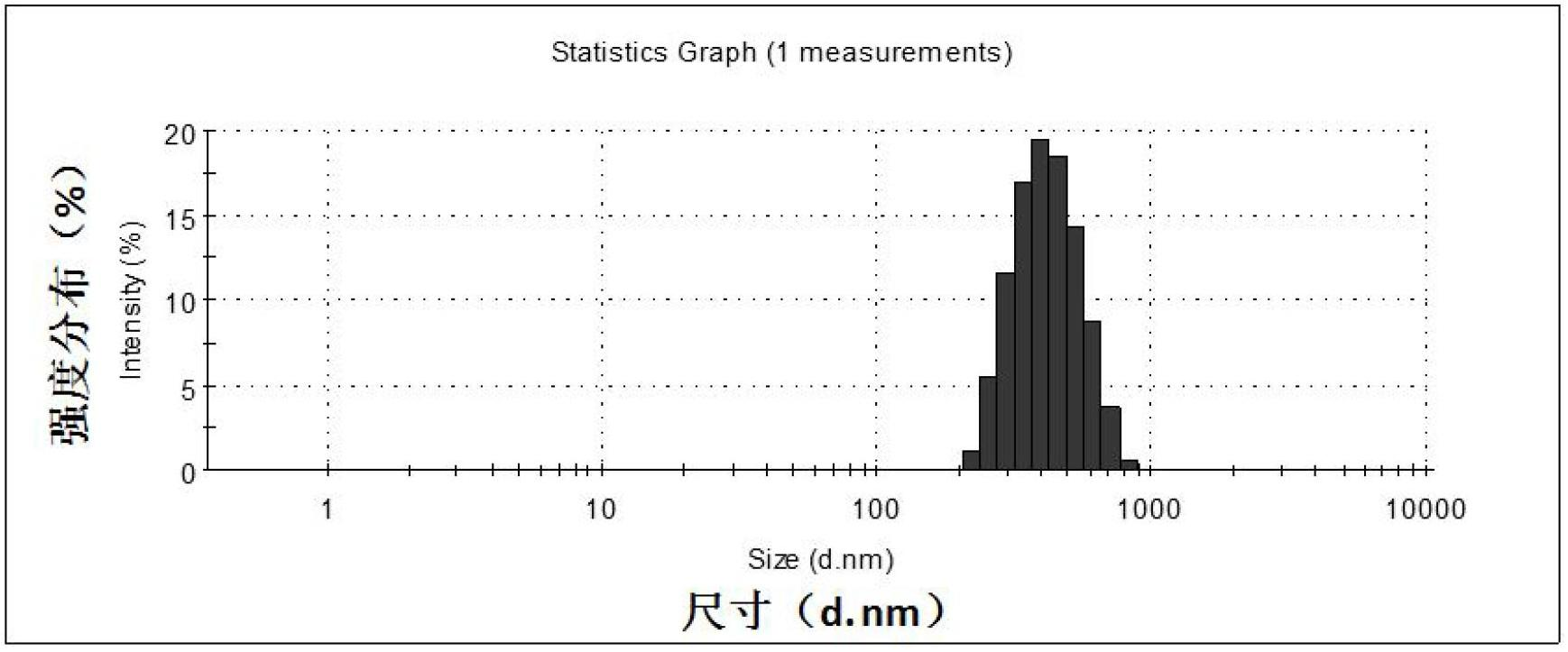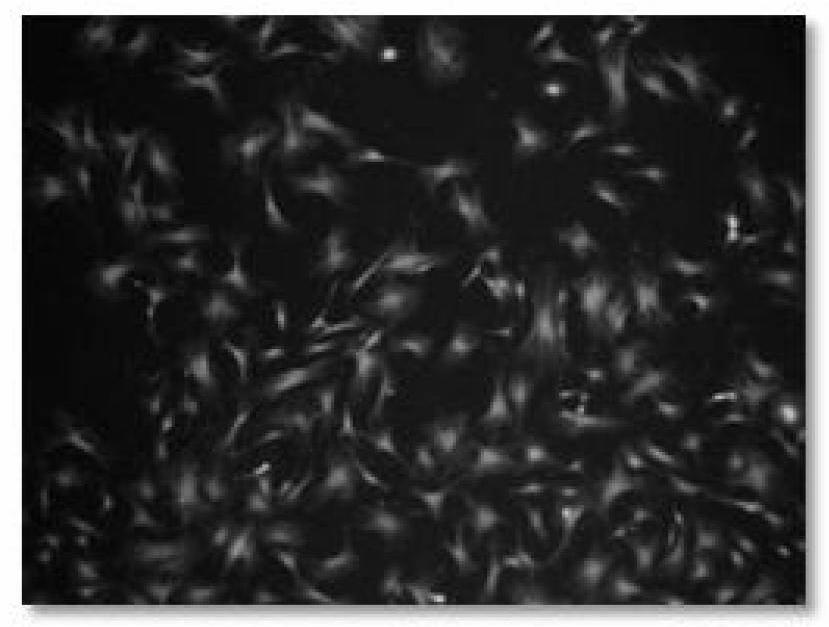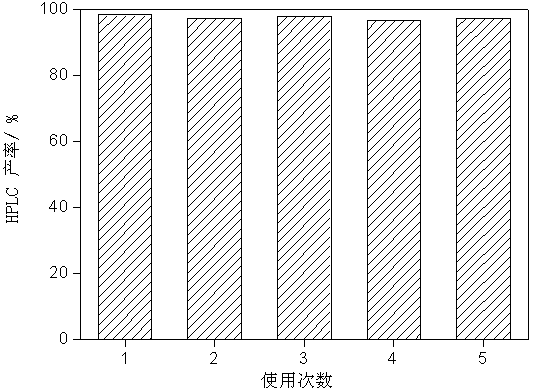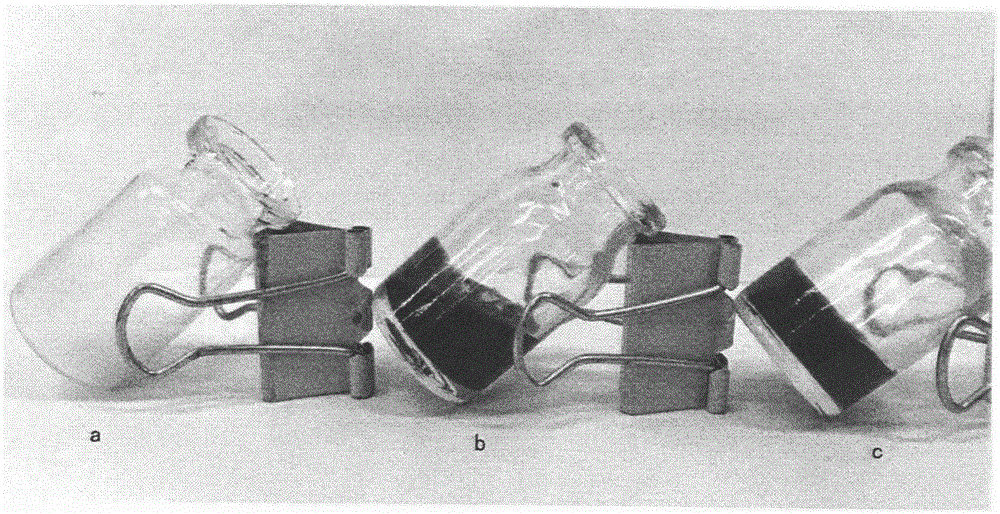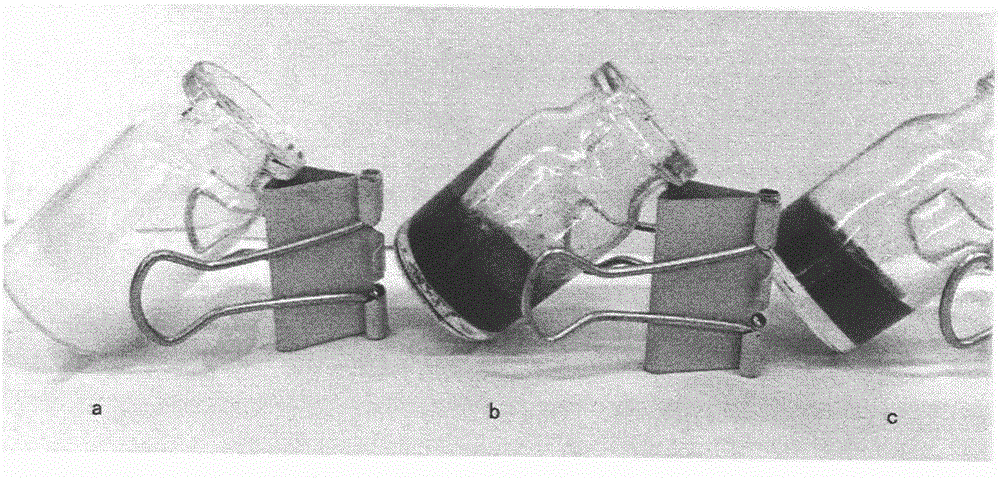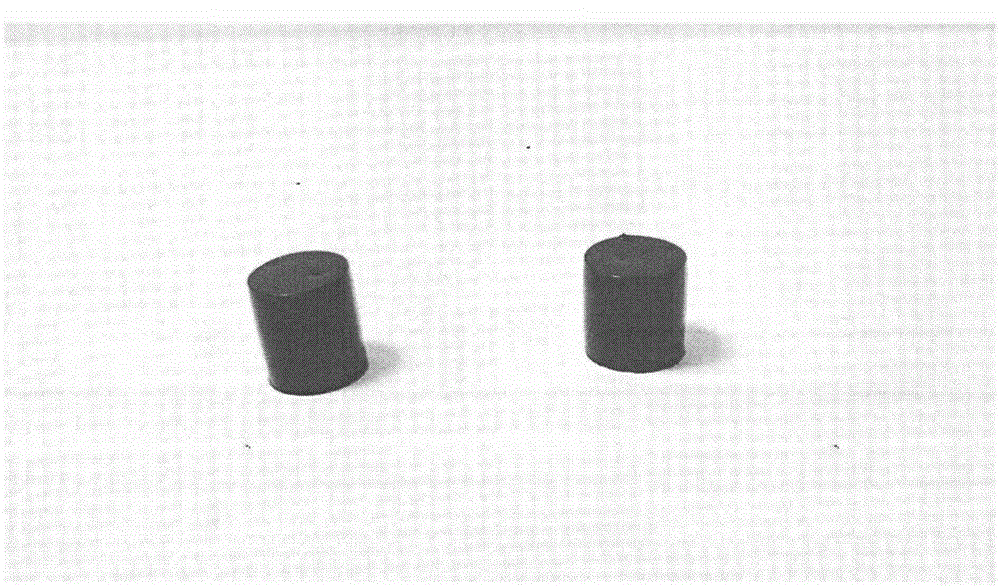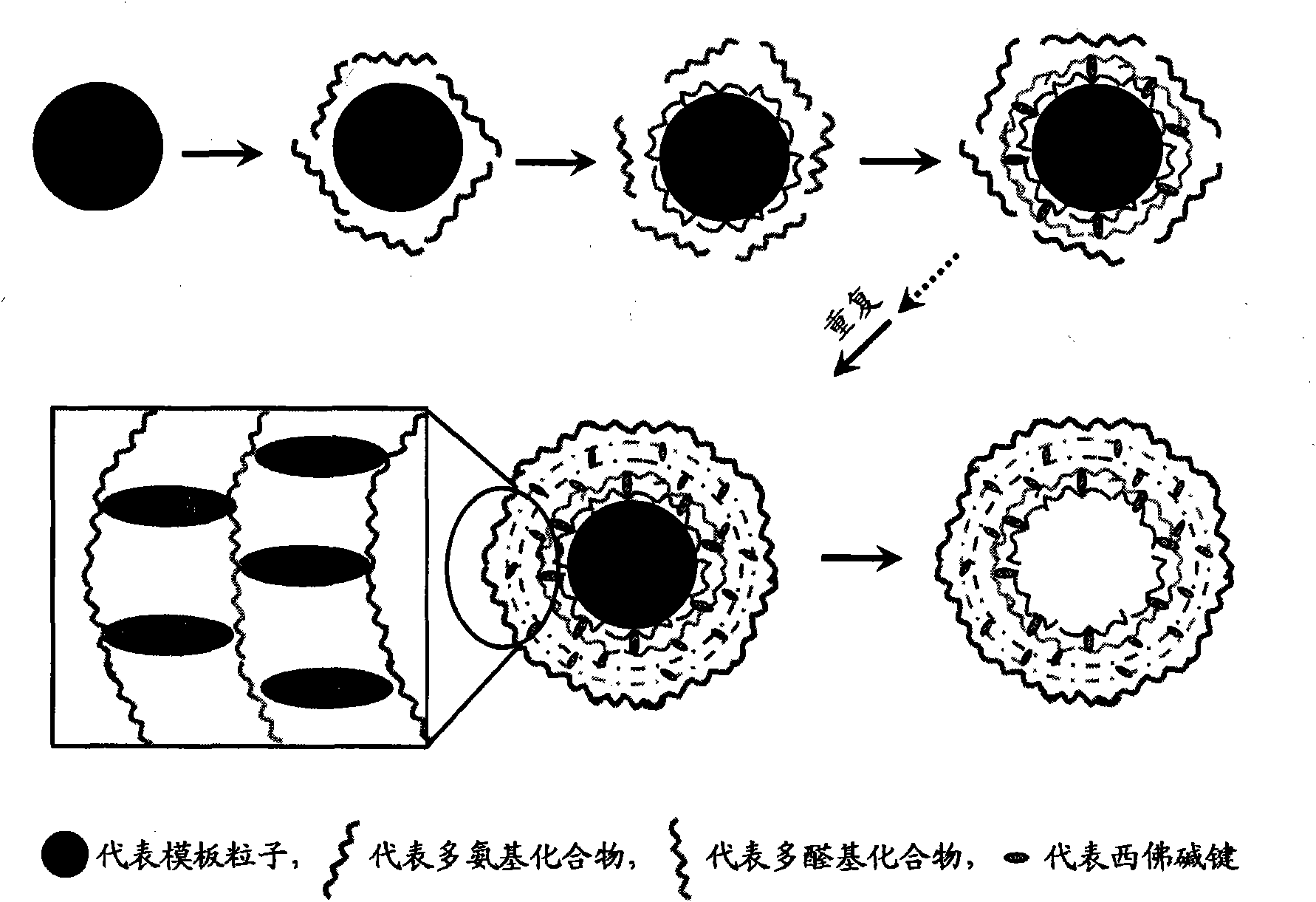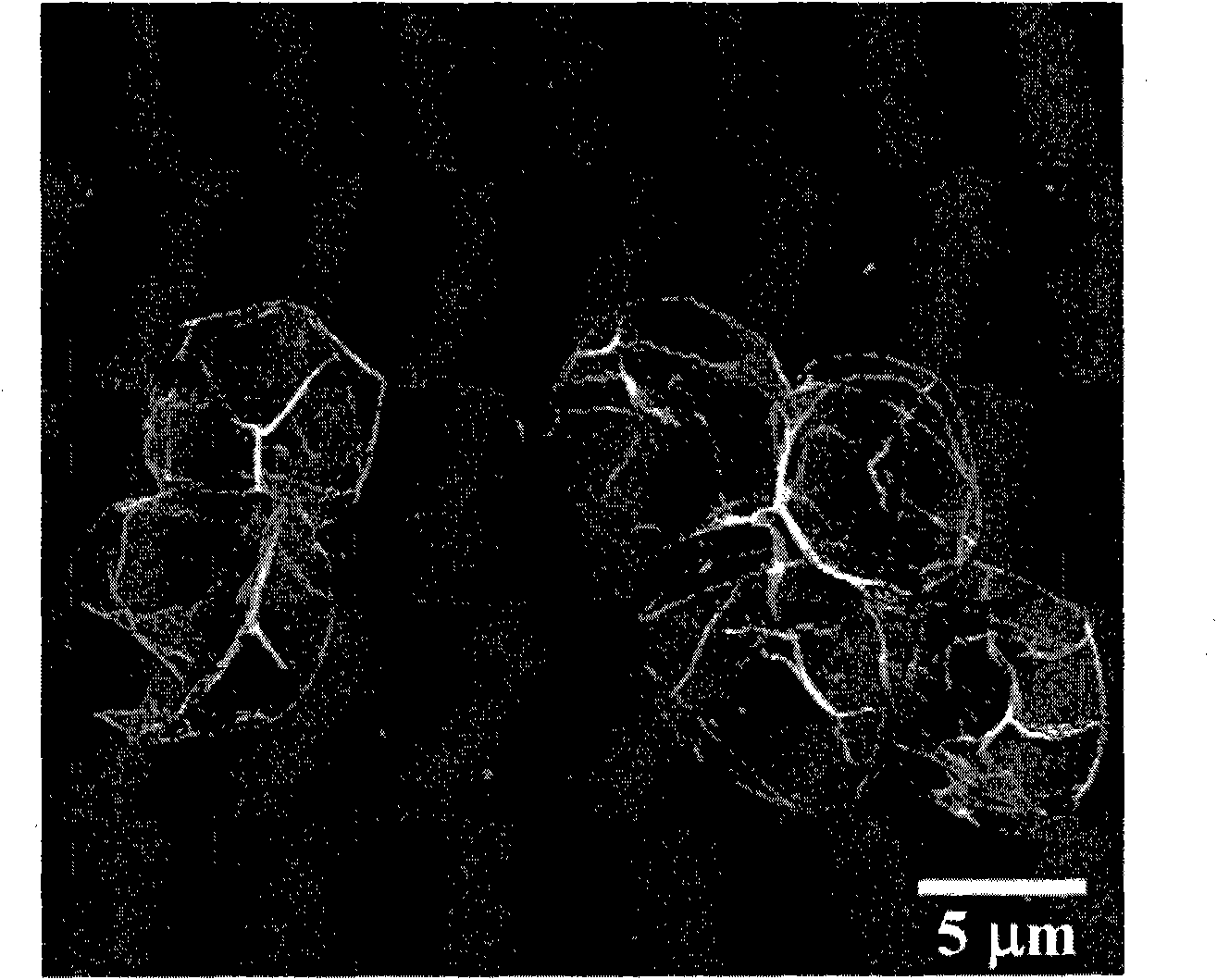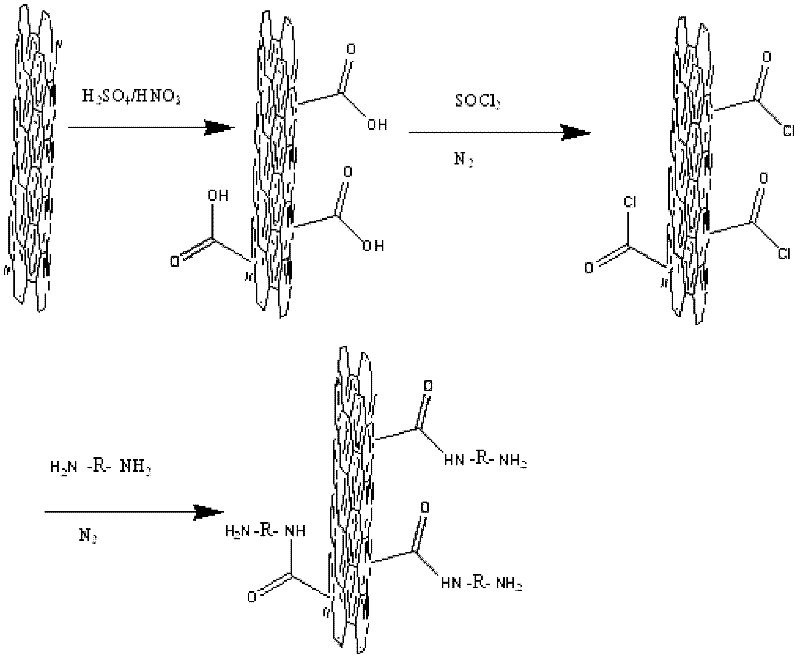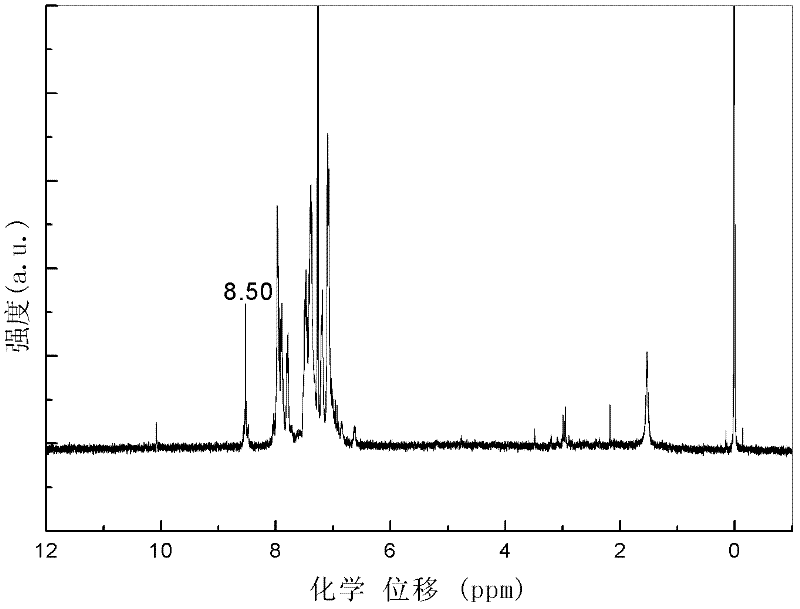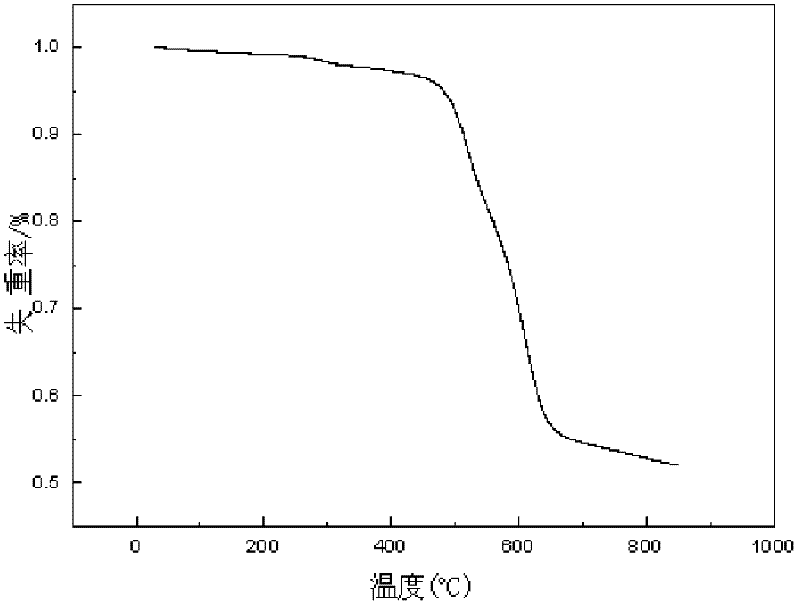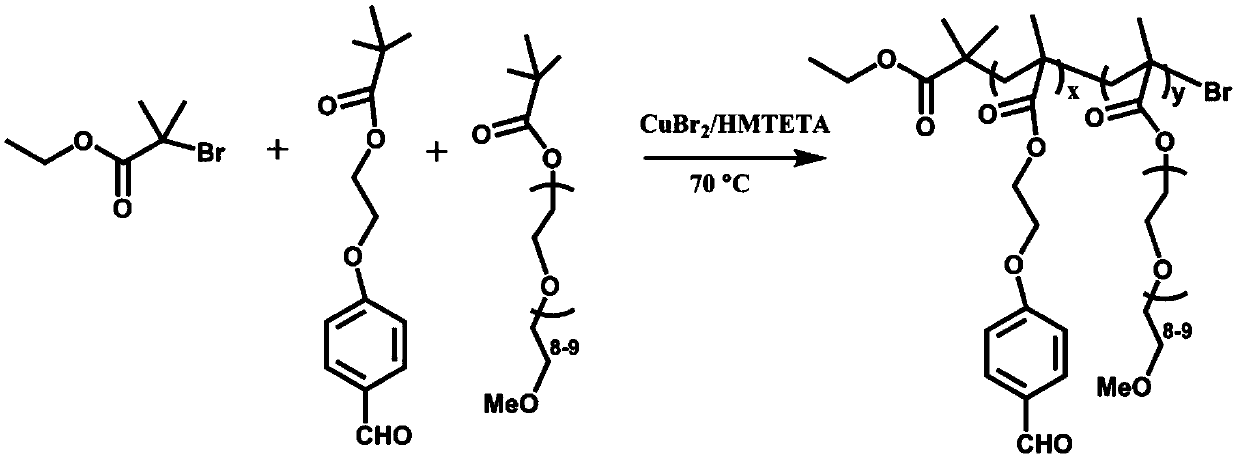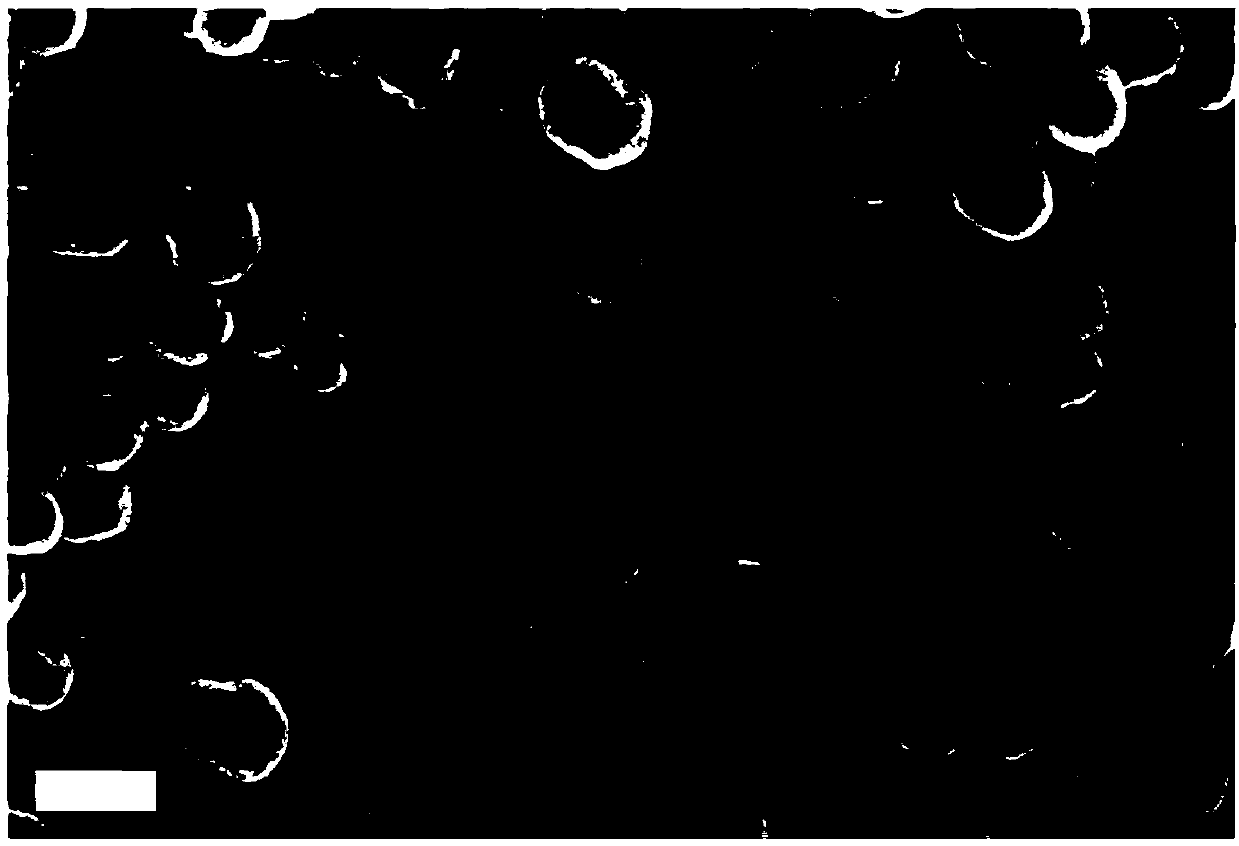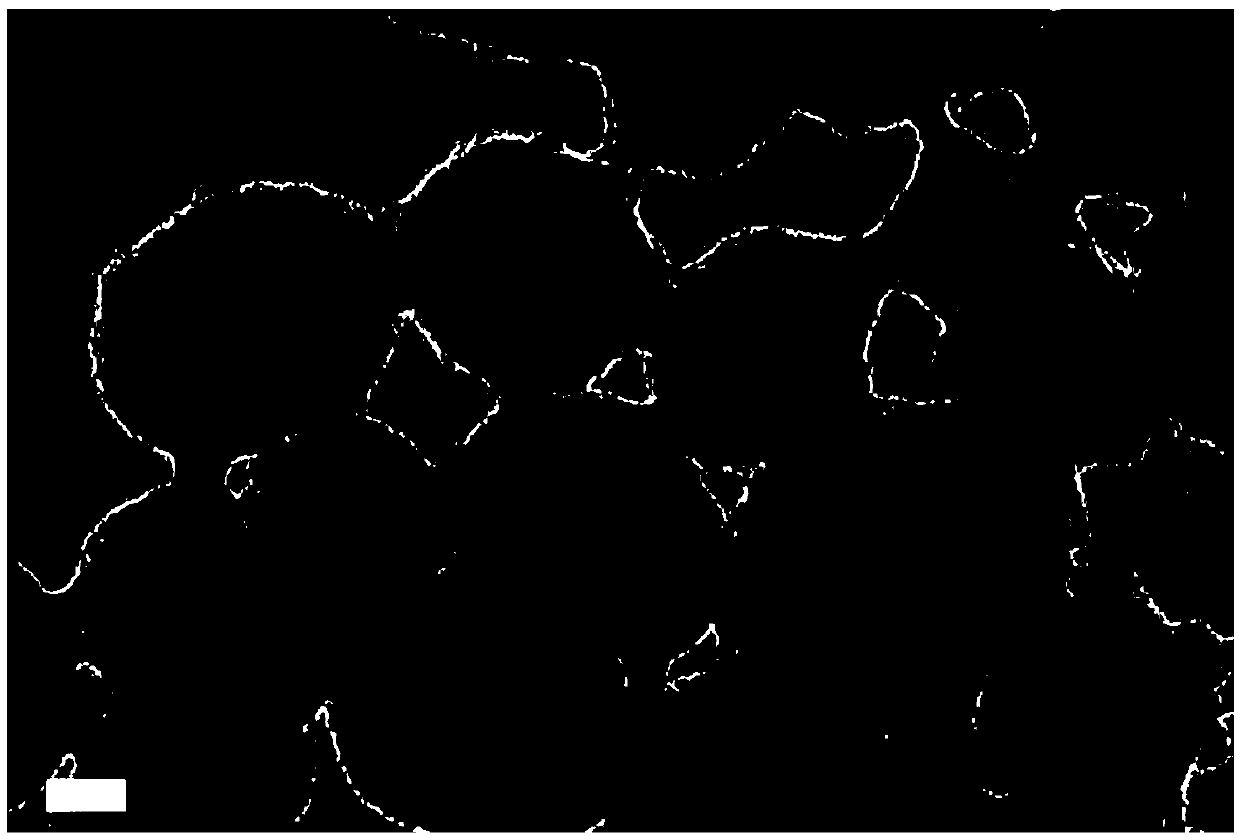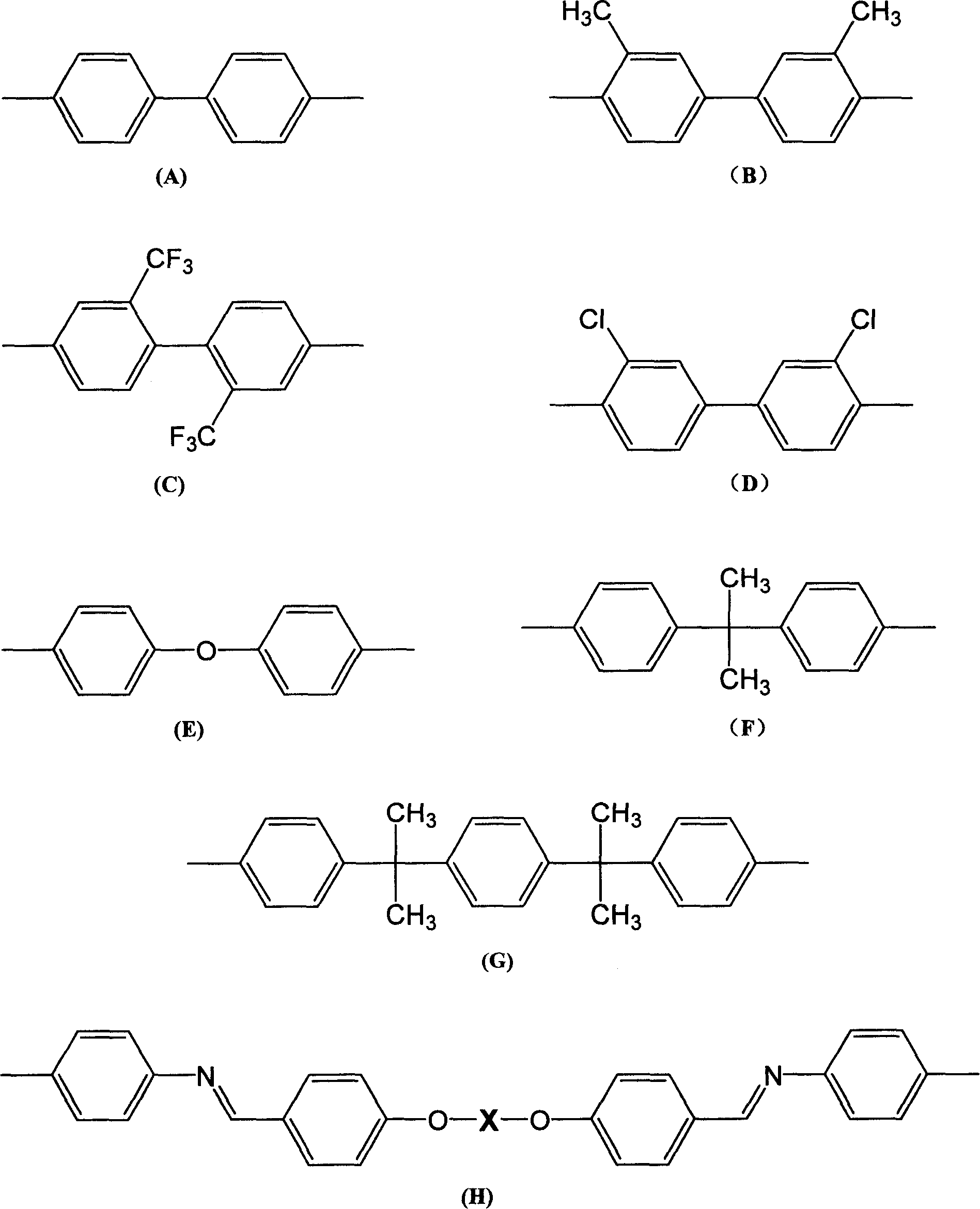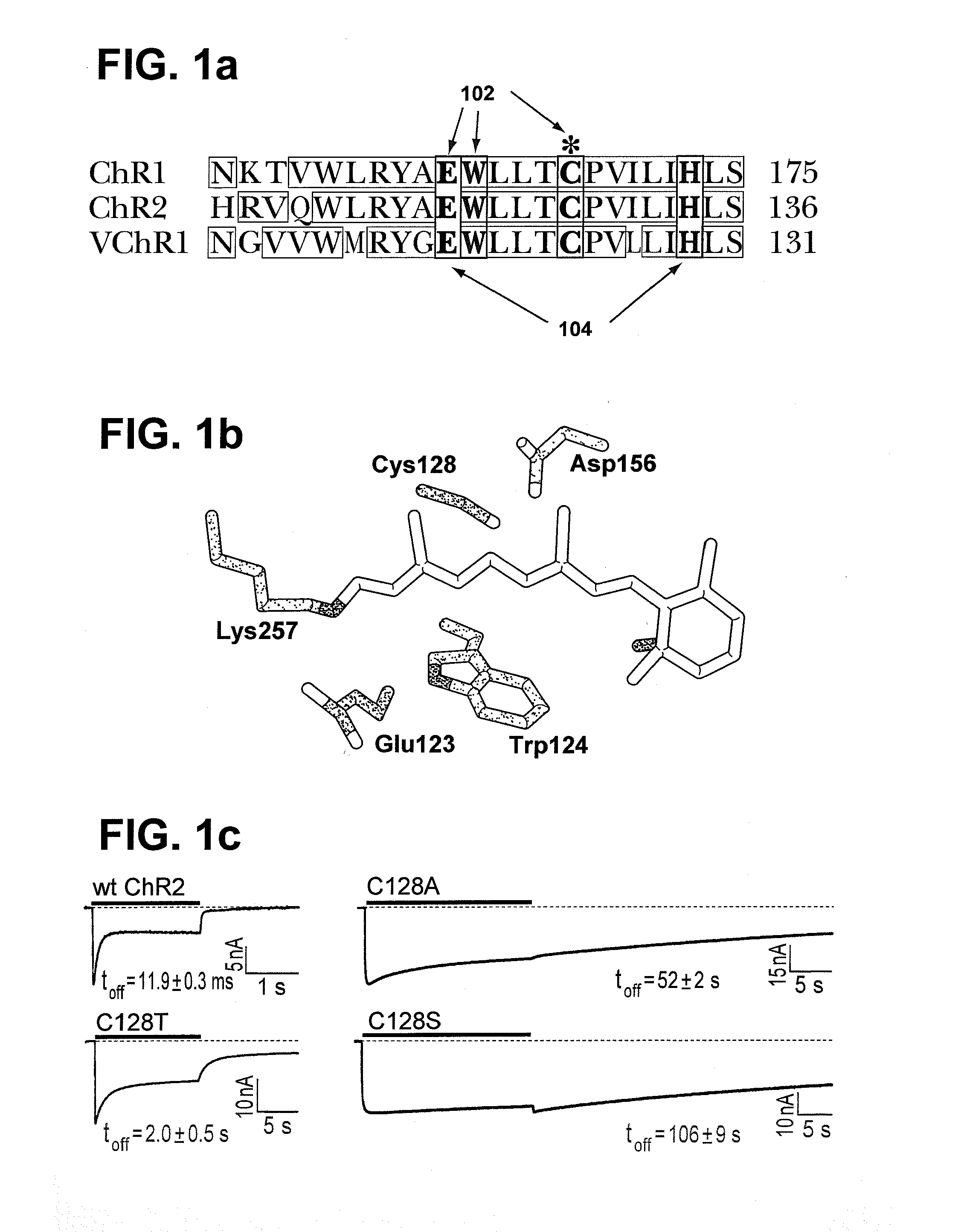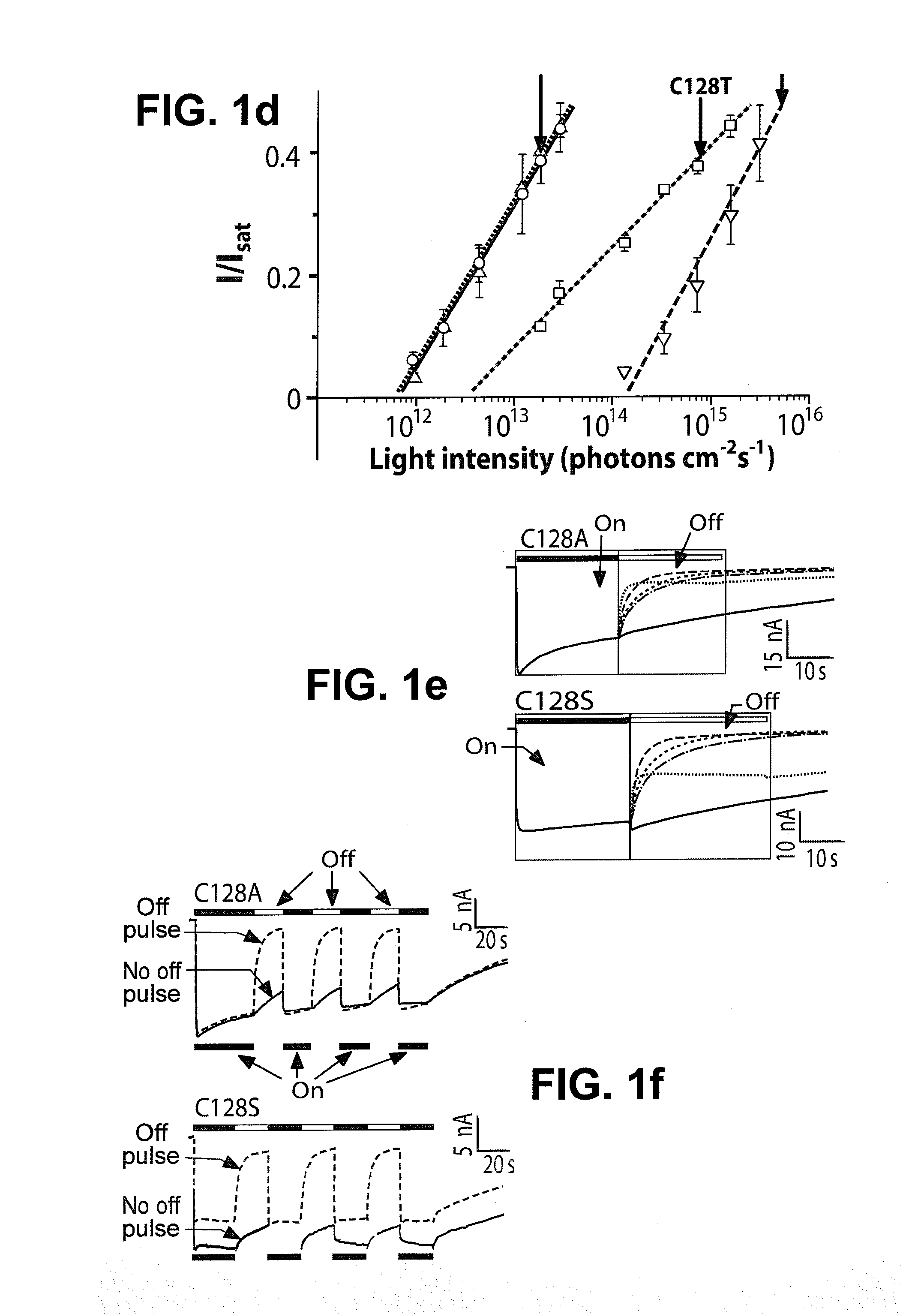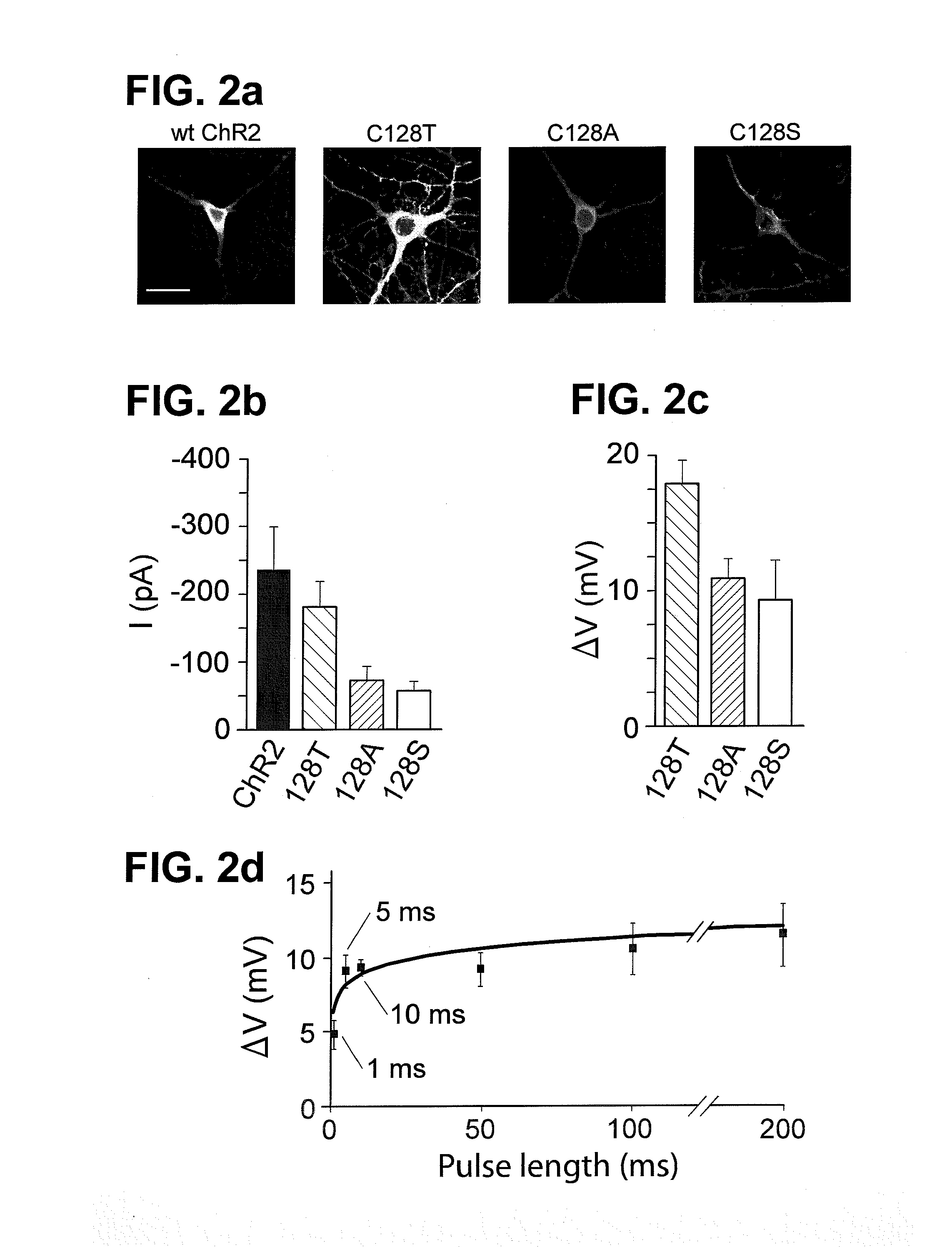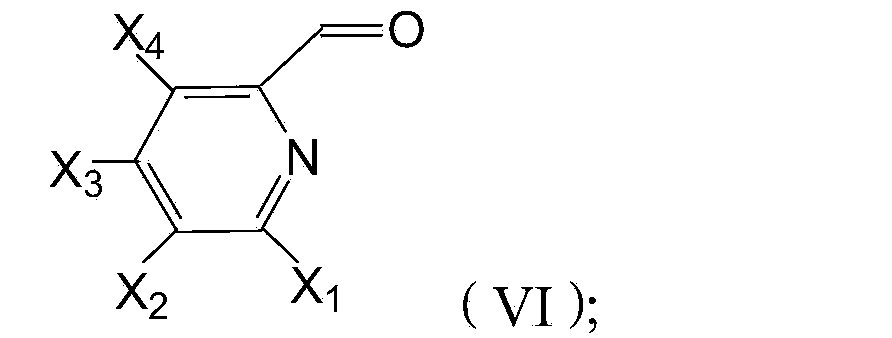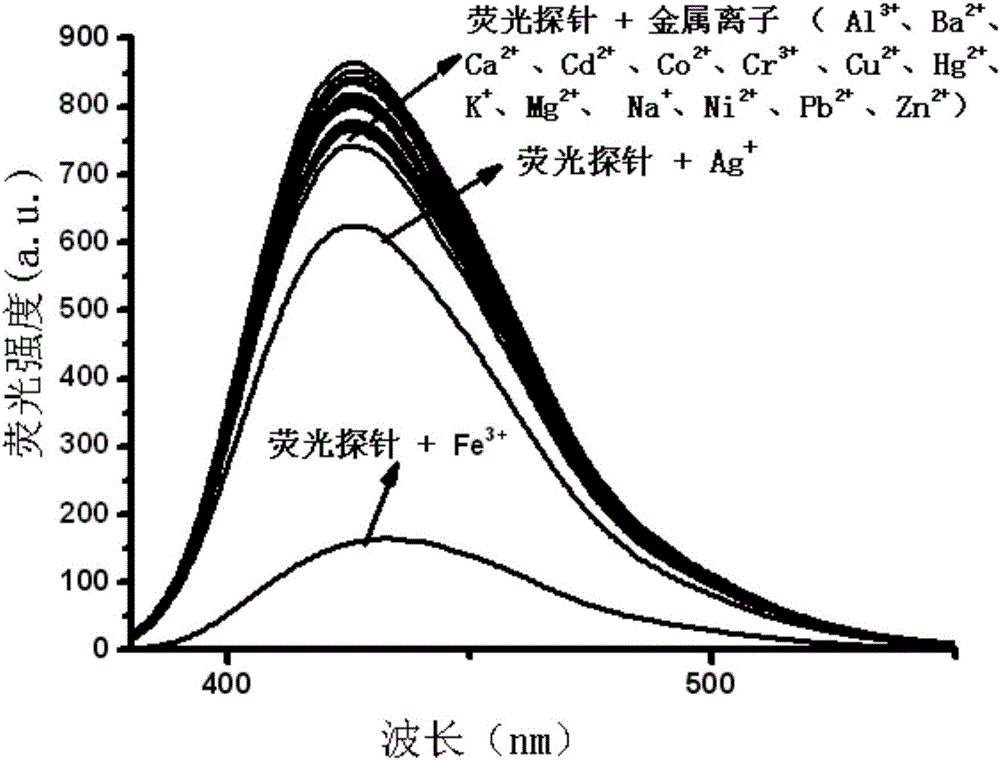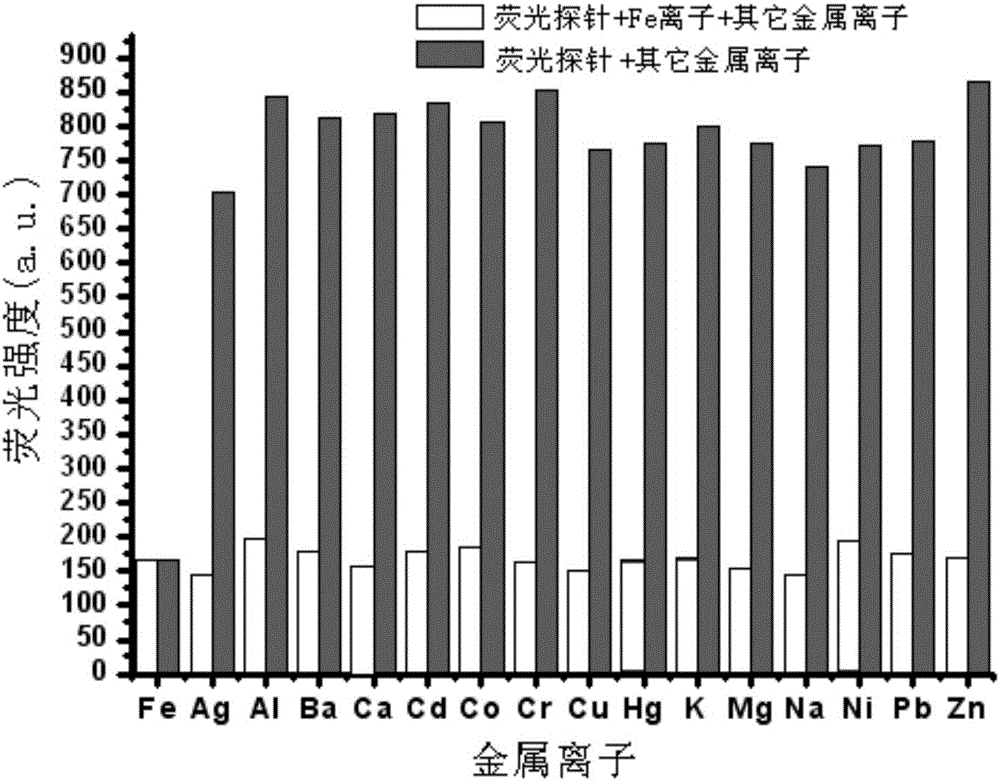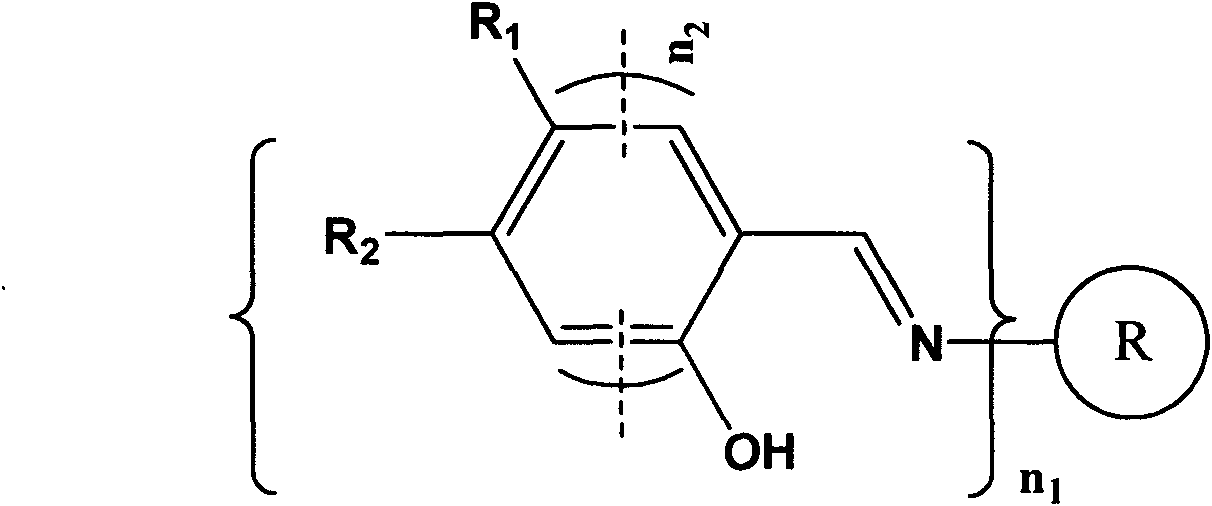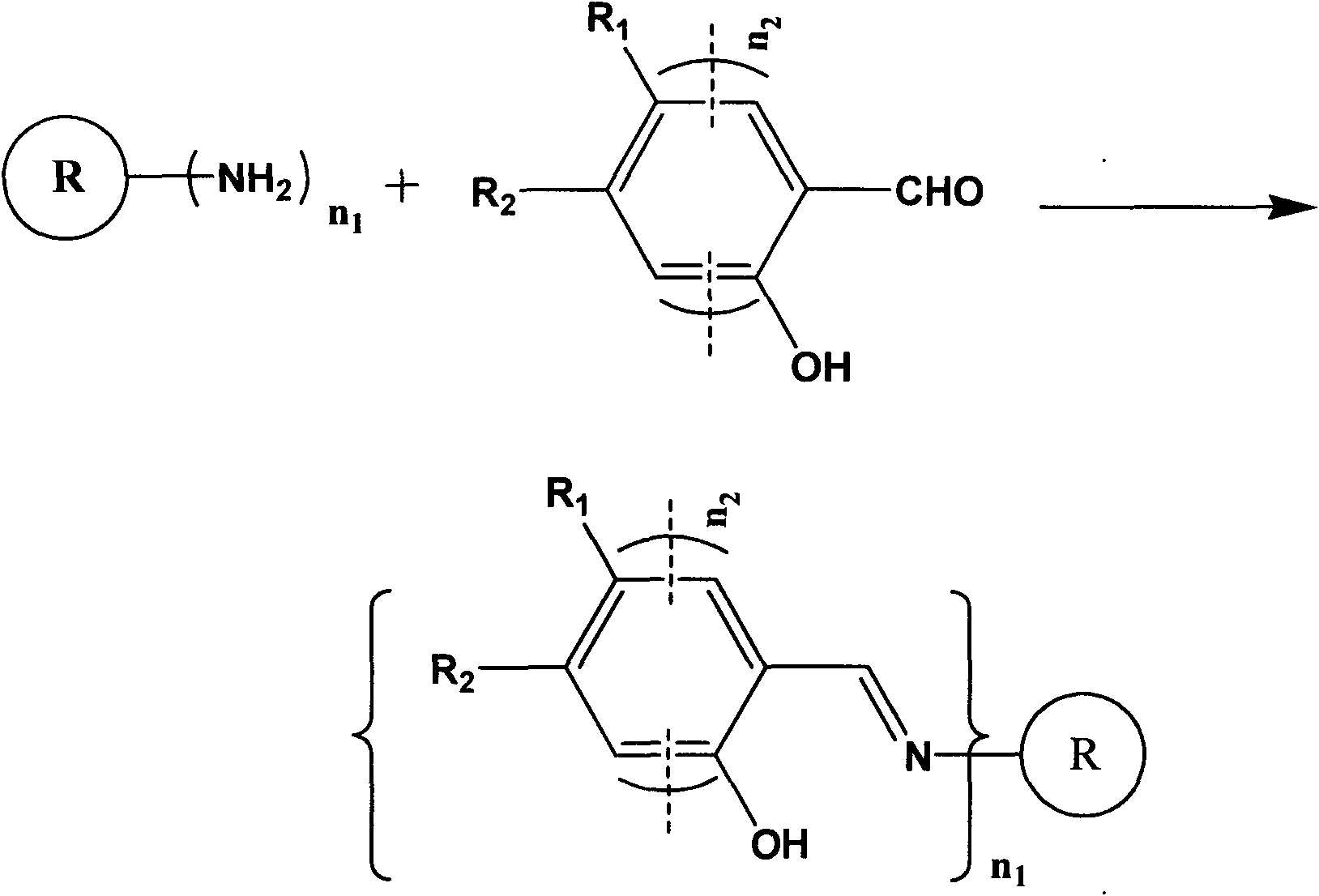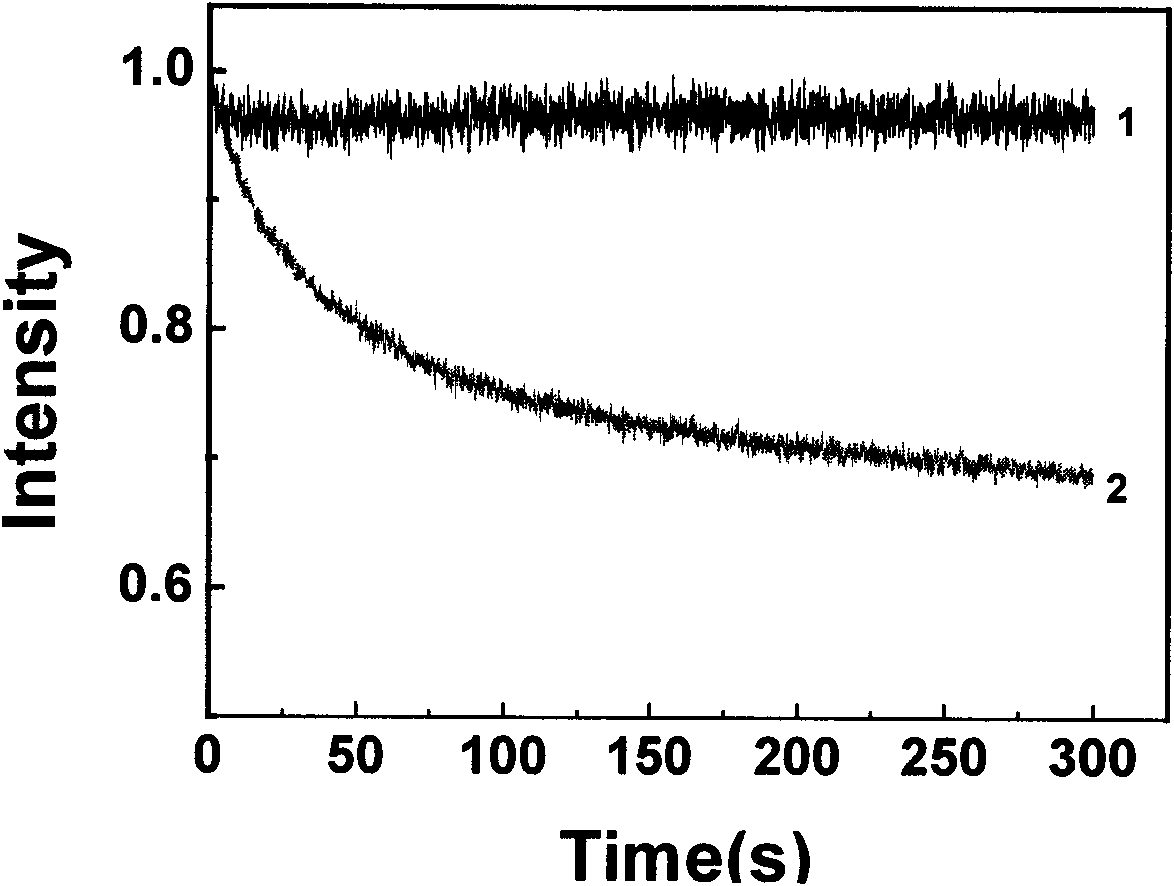Patents
Literature
Hiro is an intelligent assistant for R&D personnel, combined with Patent DNA, to facilitate innovative research.
2592 results about "Schiff base" patented technology
Efficacy Topic
Property
Owner
Technical Advancement
Application Domain
Technology Topic
Technology Field Word
Patent Country/Region
Patent Type
Patent Status
Application Year
Inventor
A Schiff base (named after Hugo Schiff) is a compound with the general structure R₂C=NR' (R' ≠ H). They can be considered a sub-class of imines, being either secondary ketimines or secondary aldimines depending on their structure. The term is often synonymous with azomethine which refers specifically to secondary aldimines (i.e. R-CH=NR' where R' ≠ H).
Double function catalyst for synthesizing polycarbonate
ActiveCN101020747AMild reaction conditionsThe process is simple and convenientAlkaneQuaternary ammonium cation
The present invention relates to one kind of high activity catalyst for catalyzing and activating CO2 to react with alkane epoxide to synthesize polycarbonate. The high activity catalyst is tetradentate Schiff base metal complex with double function, i. e., it has both electrophlic center originated from the metal ion in the complex and nucleophilic center originated from the quaternary ammonium salt or quaternary phosphonium salt connected to the benzene ring in the complex. The catalyst can catalyze the reaction of CO2 and alkane epoxide effectively to prepare polycarbonate.
Owner:DALIAN UNIV OF TECH
Optically-based stimulation of target cells and modifications thereto
Stimulation of target cells using light, e.g., in vivo or in vitro, is implemented using a variety of methods and devices. One example involves a vector for delivering a light-activated molecule comprising a nucleic acid sequence that codes for light-activated molecule. The light-activated molecule includes a modification to a location near the all-trans retinal Schiff base, e.g., to extends the duration time of the open state. Other aspects and embodiments are directed to systems, methods, kits, compositions of matter and molecules for ion channels or pumps or for controlling currents in a cell (e.g., in in vivo and in vitro environments).
Owner:THE BOARD OF TRUSTEES OF THE LELAND STANFORD JUNIOR UNIV
Single site catalyst for synthesizing polycarbonate
The invention discloses a high-activity catalyst which catalyzing and activating carbon dioxide to perform the copolymerization reaction with alkylene oxide to synthesize polycarbonate. The catalyst is characterized in that the catalyst is a tetradentate schiff base complex contains one or two organic base groups and has single active site initiation and controllable polymerization. The catalyst has the advantages that under milder conditions and at lower concentration of the catalyst, the catalyst can highly and efficiently catalyze the carbon dioxide to make the copolymerization reaction with the alkylene oxide to prepare the polycarbonate, the catalytic efficiency is 10<6>g polymer / mol catalyst, the polymer molecular weight is adjusted in the range of between 5,000 and 500,000, the molecular weight distribution is less than 2, the alternating structure is over 97 percent, and the catalyst can be degraded into small molecule compounds under certain condition. By utilizing the catalyst, the telomerization reaction between the carbon dioxide and two or more than two types of alkylene oxide can be catalyzed to synthesize a polycarbonate telomer with adjusting glass transition temperature.
Owner:DALIAN UNIV OF TECH
Preparation method of multiple cross-linked polysaccharide injectable hydrogel
InactiveCN104479150AGood biocompatibilityReduce usagePharmaceutical non-active ingredientsProsthesisPolymer scienceWater soluble chitosan
The invention discloses a preparation method of multiple cross-linked polysaccharide injectable hydrogel. Modified water-soluble chitosan with carboxyl or hydroxyl groups as a first component and a hydroformylation-modified polysaccharide polymer or polysaccharide polymer mixer as a second component produce electrostatic action with each other and undergo a Schiff-base reaction to produce the hydrogel with a multiple cross-linked net structure. The multiple cross-linked polysaccharide injectable hydrogel has gelling time of 5-200s and has good mechanical properties. Through change of a chitosan and polysaccharide modification rate, a mole ratio of two components and solid content of hydrogel, gelling time, mechanical strength, microscopic morphology and water content are adjusted and controlled. The gel network contains a large amount of amino, carboxyl and aldehyde groups as active groups, the active groups can be bonded to drugs and proteins by covalent bonds, the multiple cross-linked polysaccharide injectable hydrogel as a novel medical material with excellent biocompatibility has a good application prospect in the fields of regeneration medical science, tissue engineering and drug controlled release.
Owner:SHANGHAI UNIV
Non-radical photochemical crosslinked hydrogel material preparation method, product and application
ActiveCN105131315APrecise and controllable time and spaceEasy to operateOrganic active ingredientsCosmetic preparationsPolymer scienceHydroxylamine
The present invention provides a non-radical photo-crosslinked hydrogel preparation method, comprising the following steps: a component A is dissolved in a biocompatible medium to obtain a solution A, component B-hydrazide, hydroxylamine or primary amine high molecular derivative is dissolved in a biocompatible medium to obtain a solution B; the solution A and the solution B are evenly mixed to obtain a hydrogel precursor solution; under illumination, aldehyde group produced by light excitation of o-nitrobenzyl in the component A of the hydrogel precursor solution is crosslinked with hydrazone, hydroxylamine or primary amine group in the component B in the form of respective formation of oxime and Schiff base to produce the hydrogel. The present invention also provides a kit for the hydrogel preparation, and application of the hydrogel in tissue repair, beauty and as a cell, protein or drug carrier. The tissue surface light-situ gel can be achieved by the hydrogel, in particular, wound surface in-situ thin glue formation can be achieved, and the hydrogel is especially suitable for clinical wound surface tissue repair and isolation.
Owner:上海戴云化工科技有限公司 +2
Metal complexes for use in olefin metathesis and atom group transfer reactions
InactiveUS20070185343A1Promote catalysisRuthenium organic compoundsCopper organic compoundsOrganic synthesisAlkene
Improved catalysts useful in a number of organic synthesis reactions such as olefin metathesis and atom or group transfer reactions are made by bringing into contact a multi-coordinated metal complex comprising a multidentate Schiff base ligand, and one or more other ligands, with an acid under conditions such that said acid is able to at least partly cleave a bond between the metal and the multidentate Schiff base ligand of said metal complex, optionally through intermediate protonation of said Schiff base ligand.
Owner:TELENE SAS
Biocolloid hemostatic prepared by aldehyde-modified sodium alginate and amine-modified gelatine
InactiveCN101716366AEasy to prepareRapid hemostasisAbsorbent padsBandagesFibrin glueBiocompatibility Testing
The invention relates to a biocolloid hemostatic prepared by aldehyde-modified sodium alginate and amine-modified gelatine. Sodium alginate and gelatine as raw materials; according to ratio, aldehyde-modified sodium alginate solution with the concentration of 5-25% and the same volume of amine-modified gelatine solution with the concentration of 5-40% are mixed; sodium alginate is modified by aldehyde through sodium periodate oxidation; and then gel is obtained by mixing with gelatine modified by ethanediamine. The adopted gelatine and sodium alginate are safe and stable, have good biocompatibility and can be absorbed and degraded by organism. Gel is rapidly formed through Schiff base reaction of aldehyde-modified sodium alginate and amine-modified gelatine, and the gel has the same gel-forming time as fibrin glue but better adhesion property and adhesion strength, can be acted on any part of body through simple local spraying or injection, and can be used as substitute product of fibrin glue.
Owner:TIANJIN UNIV
Curcumin-polysaccharide conjugate as well as preparation method and application thereof
InactiveCN102988999AHigh drug loadingHigh encapsulation efficiencyPowder deliveryAntipyreticSolubilitySide effect
The invention relates to a curcumin-polysaccharide conjugate as well as a preparation method and application thereof. The preparation method comprises the following steps of: grafting amino acid at one terminal of a diamine compound to polysaccharide through amidation to obtain a polysaccharide macromolecule with a free terminal of amino acid; and introducing curcumin on the polysaccharide frame by a Schiff base reaction. The preparation method is characterized in that 1, the water solubility and in-vivo and in-vitro stability of the curcumin can be improved due to grafting modification on the curcumin, and the generated curcumin-polysaccharide conjugate can be used as a novel macromolecular medicament indepterminalently; 2, the curcumin-polysaccharide conjugate has a strong oral absorption promoting effect, is high in safety, and can achieve the effects of promoting medicament absorption, improving the curative effect, reducing the toxic and side effect of the conjugate and the like; and 3, the amphipathy of the polysaccharide molecule is improved by introducing the hydrophobic group curcumin, so that the curcumin-polysaccharide conjugate can be self-assembled into nano-micelle, and can be used as a vector of an insoluble medicament. The preparation method is simple, low in cost, and applicable to large-scale continuous production.
Owner:CHINA PHARM UNIV
Imine coupled covalent organic framework material and preparation method and application thereof
ActiveCN106967216AGood chemical stabilityImprove thermal stabilityOrganic-compounds/hydrides/coordination-complexes catalystsCatalytic reactionsOrganic reactionStructural formula
The invention provides an imine coupled covalent organic framework material and a preparation method and application thereof and belongs to the technical field of porous materials. The structural formula of the imine coupled covalent organic framework material is shown in the description, and the material can be prepared by triazinyl aromatic polyamine A and alkoxy substituted aromatic aldehyde B through simple Schiff base condensation reaction. Under visible light excitation condition, the prepared imine coupled covalent organic framework material can catalyze multiple types of organic reactions, specifically for example reaction for photocatalysis of N-aryl tetrahydroisoquinoline and nucleophilic reagent. The prepared covalent organic framework material has very good chemical stability and heat stability, high specific surface area and high crystallinity, has strong visible light absorption properties, can serve as an excellent heterogeneous photocatalyst and has good industrial application prospect.
Owner:JILIN UNIV
Stereoselective alternating copolymerization of epoxide with carbon dioxide
The present invention provides a method for manufacturing polycarbonate, which has a high conversion rate of a propylene oxide material into a polymer and can control stereoregularity of the macromolecular structure, and a catalytic compound for the manufacturing method.The manufacturing method of the present invention is a method for manufacturing a polycarbonate copolymer by copolymerizing an epoxide compound as a monomer with carbon dioxide in the presence of a planar tetracoordinate-type cobalt-Schiff base complex, wherein a ligand of the Schiff base is N,N′-bis(2-hydroxybenzylidene)ethylenediamine, N,N′-bis(2-hydroxybenzylidene)phenylenediamine, or a derivative thereof, and a methyl group substituted with an amino group having an asymmetrical carbon atom or an asymmetrical axis is introduced to the 3- and / or 3′-position of the benzene ring derived from the salicyl group. In addition, the catalytic compound of the present invention is a cobalt-Schiff base complex, wherein a methyl group substituted with an amino group having an asymmetrical carbon atom or an asymmetrical axis is introduced to the 3- and / or 3′-position of the salicyl group.
Owner:THE UNIV OF TOKYO
Multicoordinated metal complexes for use in metathesis reactions
InactiveUS20080293905A9Ruthenium organic compoundsOrganic-compounds/hydrides/coordination-complexes catalystsAlkyneAlkene
Owner:RIMTEC CORP
Method for preparing high-throughput covalent organic framework nano-filtration membrane on basis of interfacial polymerization
ActiveCN108889139AGood chemical stabilityHigh permeation fluxSemi-permeable membranesFiltration membraneBinding force
The invention provides a method for effectively preparing a high-throughput covalent organic framework (COFs) nano-filtration membrane on the basis of interfacial polymerization. The method comprisesthe following steps: sequentially applying an aqueous phase solution dissolved with polyamine monomers and an organic phase solution dissolved with polyaldehyde / polyketones monomers to the surface ofa porous carrier to carry out interfacial polymerization; diffusing the polyamine monomers in the aqueous phase solution saturated porous carrier to a water / oil interface to carry out schiff base reaction with polyaldehyde / polyketones in an organic phase, and gradually forming a covalent organic framework separating layer on the surface of the porous carrier by a conformal growth manner; and thencarrying out heat treatment on a composite membrane consisting of the separating layer and the porous carrier to enhance the binding force of the covalent organic framework separating layer and the porous carrier, and promoting crystallization and conversion of the covalent organic framework. The method not only is simple and convenient to operate and short in technological process, but also is well compatible with an existing process, thus, continuous product becomes possible, and the prepared composite membrane has high flux.
Owner:NANJING UNIV OF TECH
Porphyrin containing covalent organic frameworks and process for the preparation thereof
Disclosed herein is novel highly stable, crystalline porphyrin containing covalent organic frameworks and their synthesis using Schiff base reaction which are hydrophobic in nature having good selectivity towards alcohol uptake at low pressure over water. Particularly, present invention provides novel highly stable, porous covalent organic frameworks (COFs) comprising porphyrin linked hydroxyl aromatic compound by intramolecular O—H—N═C bonding; wherein porphyrin is tetra(p-amino-phenyl)porphyrin (Tph) and hydroxyl aromatic compound is selected from group consisting of Triformylphloroglucinol (Tp), 2,5-dihydroxyterephthalaldehyde (Da).
Owner:COUNCIL OF SCI & IND RES
Spherical covalent organic framework material as well as preparation method and application thereof
ActiveCN109320734AGood size controlUniform pore sizeOther chemical processesStationary phaseOrganic solvent
The invention provides a spherical covalent organic framework material as well as a preparation method and application thereof. The preparation method comprises the following steps: dissolving two covalent organic framework construction elements containing an amino group and an aldehyde group into an organic solvent respectively; after carrying out ultrasonic dispersion, rapidly adding a catalyst;carrying out Schiff base reaction at certain temperature to synthesize the spherical covalent organic framework material. The preparation method has a simple preparation process and the reaction is moderate; the prepared spherical covalent organic framework material has the advantages of controllable size, uniform pore diameter, large specific surface area, good crystal form structure, good chemical stability, good mechanical stability and the like; the spherical covalent organic framework material is used as a chromatography stationary phase and a sample loading amount can be greatly increased; the spherical covalent organic framework material contains a lot of benzene ring structures and has relatively strong hydrophobic performance, so that rapid separation of hydrophobic organic compounds is easy to realize; the spherical covalent organic framework material has a good application prospect.
Owner:FUZHOU UNIV
Carbon nano tube composite film and preparation method thereof
ActiveCN103435027AEvenly dispersedAvoid reunionMaterial nanotechnologyCarbon compoundsComposite filmCatecholamine
The invention discloses a preparation method for a carbon nano tube composite film. The method comprises the following steps: first, allowing a phenolic hydroxyl group, a quinonyl group and other functional groups to be introduced on the surface of a carbon nano tube through oxidation autopolymerization reaction of catecholamine under an alkalescence condition, so as to realize the modification for the surface of the carbon nano tube; then, using water-soluble polymers with amino groups or mercapto groups as raw materials to realize layer-by-layer self-assembly under the action of chemical bonds formed by Schiff base or Michael Addition reaction, thereby obtaining the carbon nano tube composite film. The method has the advantages of mild reaction condition, environmental protection, simplicity and feasibility, and is suitable for industrialized production. The carbon nano tube composite film prepared by the method has the advantages of excellent thermal and chemical stability, ductility, mechanical strength and transparency.
Owner:ZHEJIANG UNIV
Covalent organic framework material and preparation method thereof
ActiveCN108219158AReduce energy consumptionEasy to operateGas treatmentOther chemical processesRoom temperatureBoric acid
The invention discloses a covalent organic framework material and a preparation method thereof and belongs to the technical field of preparation of covalent organic framework materials. Multiple covalent organic framework materials are quickly synthesized under a room temperature and an open system by utilizing ionothermal reaction, and include a Schiff-base type covalent organic framework material and a boric-acid type covalent organic framework material, and also include covalent organic framework materials with two-dimensional and three-dimensional structures. The synthetic method has the advantages of short reaction time, low energy consumption, no pollution of volatile organic matters, no additive, simple operation and the like. Ironic liquid can be reused for at least three times after being simply filtered and separated. The covalent organic framework material synthesized by the method has potential application in the aspects of gas storage and separation and the like because ofloading the ironic liquid.
Owner:JILIN UNIV
Fluorescent schiff base conjugate cu(II) chemosensors and methods thereof
Fluorescent Schiff base compounds comprising a xanthene dye based moiety and an alkyl imidazole moiety. Methods of assessing these fluorescent Schiff base compounds as fluorescent probes for metal ions in Cu2+ chemosensing applications, methods of preparing the fluorescent Schiff base compounds and methods of detecting Cu2+ ions with the same are also provided.
Owner:KING FAHD UNIVERSITY OF PETROLEUM AND MINERALS
Method for performing amino functionalizing on carbon fiber surface
InactiveCN105113260AWill not damage the structureRetain high-strength and high-model featuresCarbon fibresFiberState of art
The invention relates to a method for performing amino functionalizing on a carbon fiber surface. The method comprises the steps that the fiber surface is coated with a copolymer coating containing a large amount of active amino by utilizing a Michael addition and Schiff base reaction of dopamine and poly-amino molecules through a one-step solution dipping method. Compared with the prior art, the method is simple in technology and mild in condition, does not damage a fiber body structure and can effectively increase active groups of the carbon fiber surface, and therefore the interface bonding property between fiber and resin is improved.
Owner:SHANGHAI JIAO TONG UNIV
Tetradentate schiff base metal complexes, metal porphyrin complexes and preparing method of polycarbonate
ActiveCN102558199AHigh catalytic activityPrevent the problem of excessive toxic metal contentGroup 5/15 element organic compoundsMagnesium organic compoundsQuaternary ammonium cationPorphyrin
The invention provides tetradentate schiff base metal complexes with formula (I) and metal porphyrin complexes with formula (II). The active centers of the two complexes are non-toxic zinc, magnesium, manganese or iron. The invention also provides a method for preparing polycarbonate by using the complexes as a catalyzer. The ligand of the two complexes contain at least one or more quaternary ammonium salt or strong sterically hindered organic base group, so the two complexes have higher catalytic activity, meanwhile the complexes have non-toxic active center metal like zinc, magnesium, manganese or iron, can effectively prevent the problem of the exceeding content of toxic metals in polycarbonate and ensure that the product does not contain toxic metal residues.
Owner:CHANGCHUN INST OF APPLIED CHEMISTRY - CHINESE ACAD OF SCI
Method for immobilizing VEGF-carried heparin/polylysine nanoparticles on Ti surface
InactiveCN102677032AIncrease loading capacityExtended half-lifeSurgeryPharmaceutical containersNanoparticlePolylysine
The invention discloses a method for immobilizing VEGF-carried heparin / polylysine nanoparticles on a Ti surface, which comprises the following steps: by utilizing the characteristic that Hep and PLL can produce static interactions to form nanoparticles, mixing VEGF-carried Hep and PLL to form VEGF-carried nanoparticles; preparing a DM coating on the Ti material surface; and by utilizing the characteristic that the DM and primary amino group can generate Michael addition and Schiff base reaction, immobilizing the amino-containing nanoparticles onto the sample surface in a covalent mode, thereby constructing the biologically modified surface with anticoagulation and endothelium promotion functions. By constructing a nanoparticle modifying layer with anticoagulation and endothelium promotion characteristics on the Ti surface, the invention obviously improves the blood compatibility and endothelium injury restorability of the material.
Owner:SOUTHWEST JIAOTONG UNIV
Graphene oxide supported Schiff base palladium catalyst as well as preparation method and application thereof
InactiveCN103447092AAvoid churnAvoid gatheringOrganic compound preparationOrganic chemistry methodsPalladium catalystBULK ACTIVE INGREDIENT
The invention relates to a graphene oxide supported Schiff base palladium catalyst as well as a preparation method and application thereof. A catalyst carrier is a graphene oxide prepared by an improved Hummers process, ligand is Schiff base and an active ingredient is palladium salt; the capacity of the palladium in the active ingredient palladium salt is 5.0%-10.0% of the total mass of the catalyst, the diameter of the graphene oxide is 1 mu m-5 mu m, the thickness of the graphene oxide is 0.8 nm-1.2 nm, and the particle diameter of a palladium nano particle is 3 nm-8 nm. The graphene oxide-supported Schiff base palladium catalyst can be used for preventing the palladium from losing in a catalysis process, meanwhile, the graphene oxide has a unique two-dimensional planar structure and can also be used for improving dispersing performance of the palladium nano particle on the surface of the graphene oxide to prevent the palladium from gathering in the catalysis process, so that the catalytic activity of the supported type catalyst is improved. Therefore, the graphene oxide-supported Schiff base palladium catalyst disclosed by the invention can be used for preventing the palladium from gathering and losing better in a catalytic C-C (Carbon-Carbon) coupling reaction process, and has higher catalytic activity and better recycling performance.
Owner:EAST CHINA UNIV OF TECH
Injectable bone repair hydrogel and preparation method thereof
InactiveCN106310383ANo damageMild reaction conditionsPharmaceutical delivery mechanismTissue regenerationCalcium biphosphateInjectable bone
The invention discloses an injectable bone repair hydrogel and preparation method thereof. The hydrogel is prepared according to the following steps: carrying poly-dopamine (PDA) modified calcium phosphate particles on degradable natural polymers with aldehyde group in an immobilized way, and then mixing the degradable natural polymers with amino group and the degradable natural polymers carrying the PDA modified calcium phosphate particles in an immobilized way and having an aldehyde group to generate Schiff base reaction. The hydrogel disclosed by the invention is formed by the Schiff base reaction of natural polymers in physiological conditions, does not release heat violently, cannot cause damage of peripheral tissues in clinical application, and is applicable to clinical born repair materials.
Owner:中国人民解放军西部战区总医院
Layer-by-layer assembled microcapsule and its preparation method
ActiveCN102335575AImprove stabilityPharmaceutical non-active ingredientsMicroballoon preparationCross-linkBiocompatibility Testing
The invention relates to a biologically compatible microcapsule and its preparation method, especially a Schiff base bond based and layer-by-layer assembled biologically compatible microcapsule and its preparation method. The microcapsule is characterized in that the capsule wall consists of biologically compatible and biodegradable polysaccharides and derivatives thereof, and the Schiff base bond forms among the capsule wall components without employing additional cross linking agent. Compared with microcapsules prepared by traditional methods, the microcapsule obtained in the method has the advantages of good stability, biocompatibility, biodegradability, nontoxity, auto-fluorescence and pH responsive permeability, as well as no need for a cross linking agent.
Owner:INST OF CHEM CHINESE ACAD OF SCI
Carbon nanotube/poly-Schiff base polymer and its preparation method and application
InactiveCN102295775AImprove high temperature resistanceHas a third-order nonlinear characteristicTenebresent compositionsResponse sensitivityPolymer science
The invention relates to a carbon nanotube / poly Schiff base polymer, a preparation method thereof, and an application thereof. The invention relates to a composite material of carbon nanotube and poly Schiff base, a preparation method thereof, and an application thereof. With the polymer and the methods provided by the invention, problems of existing poly Schiff base of low photoelectrochromic response sensitivity and poor thermal stability are solved. According to the invention, aminated carbon nanotubes, aromatic diamine monomers, and dialdehyde compounds are subject to an in situ polymerization reaction, such that the product is obtained. First, aminated carbon nanotubes and part of dialdehyde compounds are mixed and heated until reflux liquid is generated; then aromatic diamine monomers and rest dialdehyde compounds are mixed and injected in batches, and the reaction is continued, such that the product is obtained. The polymer provided by the invention provides electrochromic, acidichromic, and photochromic performances, and has good thermal stability. Therefore, the polymer can be used in displays and acid-base sensors. The polymer has high electrochromic, acidichromic, and photochromic sensitivity, and provides reversible acidichromic and photochromic performances.
Owner:HEILONGJIANG UNIV
PH-responsive Schiff base copolymer-coated mesoporous silica drug-loaded nanoparticle as well as preparation method and application thereof
ActiveCN109589418AAchieving Quick Release RequirementsImprove hydrophilicityOrganic active ingredientsPharmaceutical non-active ingredientsPolymer modifiedBiocompatibility Testing
The invention belongs to the technical field of biomedical nanomaterials, and discloses a pH-responsive schiff base copolymer-coated mesoporous silica drug-loaded nanoparticle as well as a preparationmethod and application thereof. The nanoparticle provided by the invention comprises a mesoporous silica nanoparticle, a drug loaded inside the mesoporous silica nanoparticle, and a polymer modifiedon a surface of the mesoporous silica nanoparticle; and the polymer modified on a surface of the mesoporous silica nanoparticle is specifically P (PEGMA-co-MAEBA) modified on the surface of the mesoporous silica nanoparticle by an imine bond. The nanoparticle material provided by the invention has good biocompatibility, and realizes controlled release of the drug by utilizing an acid-sensitive imine bond; the drug is hardly released around normal cells, but the imine bond is broken in a slightly acidic environment of tumor cells, and the polymer falls off to rapidly release the drug, thereby realizing targeted therapy for the tumors; and the nanoparticle material is applicable to the field of controlled release of drugs.
Owner:SOUTH CHINA UNIV OF TECH
Schiff's base type epoxy resin of liquid crystal, preparation method and application
InactiveCN1958719AEasy to manufactureWide range of liquid crystalLiquid crystal compositionsEpoxyHeat resistance
This invention discloses a method for preparing a novel Schiff base liquid crystal epoxy resin and its application. The chemical formula of the liquid crystal epoxy resin is shown as flows, where Ar is aromatic group containing substituents or flexible intervals. The method comprises: reacting amino aromatic compound and aldehyde aromatic compound to obtain hydroxyl compound, and reacting with epoxy chloropropane in the presence of catalyst to obtain Schiff base liquid crystal epoxy resin with a yield of 75-90%. The Schiff base liquid crystal epoxy resin has liquid crystal property, and can be cured by a variety of curing agents at low temperatures. Besides, the Schiff base liquid crystal epoxy resin has such advantages as good heat resistance, low moisture absorption and low expansion, and can be used to fabricate electronic packaging material and shape-memorizing material.
Owner:FUDAN UNIV
Optically-Based Stimulation of Target Cells and Modifications Thereto
Stimulation of target cells using light, e.g., in vivo or in vitro, is implemented using a variety of methods and devices. One example involves a vector for delivering a light-activated molecule comprising a nucleic acid sequence that codes for light-activated molecule. The light-activated molecule includes a modification to a location near the all-trans retinal Schiff base, e.g., to extends the duration time of the open state. Other aspects and embodiments are directed to systems, methods, kits, compositions of matter and molecules for ion channels or pumps or for controlling currents in a cell (e.g., in vivo or in vitro environments).
Owner:THE BOARD OF TRUSTEES OF THE LELAND STANFORD JUNIOR UNIV
Quadridentate pyridyl schiff base metal complex and preparation method thereof as well as preparation method of cyclic carbonate
ActiveCN103447091APrevent toxic metal content from exceeding the standardOrganic-compounds/hydrides/coordination-complexes catalystsIron organic compoundsReaction rateCarbonate ester
The invention provides a quadridentate pyridyl schiff base metal complex with a structure as shown in a formula (I) or (II), a preparation method of the metal complex as well as a preparation method of cyclic carbonate. The cyclic carbonate is prepared by cycloaddition of carbon dioxide and epoxide in the presence of the quadridentate pyridyl schiff base metal complex and a catalyst promoter, namely quaternary ammonium salt. During cycloaddition, the quadridentate pyridyl schiff base metal complex as a main catalyst has high catalytic activity, thereby enhancing the reaction rate of cycloaddition, and also has good product selectivity, thereby enhancing the yield of cyclic carbonate in a product. Experiment results show that the product selectivity of the quadridentate pyridyl schiff base metal complex is higher than 99% and cycloaddition singly generates cyclic carbonate.
Owner:中科应化(长春)科技有限公司
Bis-Schiff-base-connected symmetrical phenanthroimidazole Fe<3+> fluorescent probe and preparation method thereof
InactiveCN105694866AHigh selectivityResponsiveOrganic chemistryFluorescence/phosphorescenceOrganic solventFluorescence
The invention relates to an Fe<3+> fluorescent probe and a preparation method thereof, particularly a bis-Schiff-base-connected symmetrical phenanthroimidazole Fe<3+> fluorescent probe and a preparation method thereof. The invention aims to solve the technical problems that the existing Fe<3+> fluorescent probe needs an organic solvent identification environment and copper ions can interfere with the identification of iron ions. The structural formula of the bis-Schiff-base-connected symmetrical phenanthroimidazole Fe<3+> fluorescent probe is disclosed in the specification. The preparation method comprises the following steps: 1. synthesizing an intermediate compound I from phenanthrenequinone, o-nitrobenzaldehyde, aniline and ammonium acetate; 2. synthesizing an intermediate compound II from the intermediate compound I, Raney nickel and hydrazine hydrate; and 3. synthesizing the Fe<3+> fluorescent probe from the intermediate compound II and terephthalaldehyde under acidic conditions. The Fe<3+> fluorescent probe can selectively identify Fe<3+> in a water-phase system within the wide pH value range of 1-9; the response time is 2 minutes; and when being used for Fe<3+> inspection, the Fe<3+> fluorescent probe has the advantage of no interference, and is convenient and quick.
Owner:QIQIHAR UNIVERSITY
Schiff base compound and method for detecting aniline compound thereof
InactiveCN101619032AImprove luminous efficiencyThe synthesis method is simpleHydrazone preparationFluorescence/phosphorescenceOrtho positionAniline
The invention relates to a Schiff base compound and a method for detecting an aniline compound thereof, belonging to the technical field of chemical sensor materials. The Schiff base compound is characterized by being prepared in such a way that an aromatic aldehyde compound with ortho-position hydroxyl reacts with monoamine or polyamine and has the structural formula shown as the figure, wherein n1 is an integer from 1 to 100, and n2 is an integer from 1 to 6; R is an aliphatic hydrocarbon substituted group, an aryl substituted group, heteroatom-substituted aliphatic alkyl or heteroatom-substituted aryl alkyl; and R1 and R2 are electron-withdrawing groups or electron-donating groups. The compound has stable solid fluorescence luminous performance, the fluorescence strength of the compound is changed by the aniline compound, the aniline compound can be detected according to the change of the fluorescence strength of the compound, and the compound is a novel fluorescence sensing material for detecting aniline.
Owner:上海新微科技发展有限公司
Features
- R&D
- Intellectual Property
- Life Sciences
- Materials
- Tech Scout
Why Patsnap Eureka
- Unparalleled Data Quality
- Higher Quality Content
- 60% Fewer Hallucinations
Social media
Patsnap Eureka Blog
Learn More Browse by: Latest US Patents, China's latest patents, Technical Efficacy Thesaurus, Application Domain, Technology Topic, Popular Technical Reports.
© 2025 PatSnap. All rights reserved.Legal|Privacy policy|Modern Slavery Act Transparency Statement|Sitemap|About US| Contact US: help@patsnap.com

